



Three
to become one Three
Page 4






to become one Three
Page 4

Study finds Australians deeply uncomfortable with abortion’s extent
■ By Anthony BarichAustralians are “deeply conflicted” about the morality of abortion according to a wide-ranging and indepth study by leading bioethicist Fr John Fleming.
In an extensive survey of Australian attitudes on the issue, the South Australian researcher found Australians want the option for legal abortion to continue to exist - but they believe it should not generally be exercised because of the moral implications.
Twelve hundred Australians aged 18 and over were interviewed by phone by Adelaide-based Sexton Marketing Group on both legal and personal morality viewpoints, then the same questions were asked of 1200 people by Newspoll. Both surveys returned similar results.
The study went beyond asking respondents whether they supported the principle of abortion’s availability, delving into their personal moral views and which moral and legal criteria they believed made abortion justifiable.
While there was community support for abortion on demand, it was “softer than anticipated”, Fr Fleming told The Record, but there was also strong community support for a reduction in abortion numbers without restricting access.
The majority of Australians think that the rate of one abortion per four pregnancies is far too high – 87 per cent of those surveyed wanted the number of abortions to be reduced, but by non-coercive means.
“Australians are deeply, deeply conflicted on abortion,” said Fr
Continued - Page 2
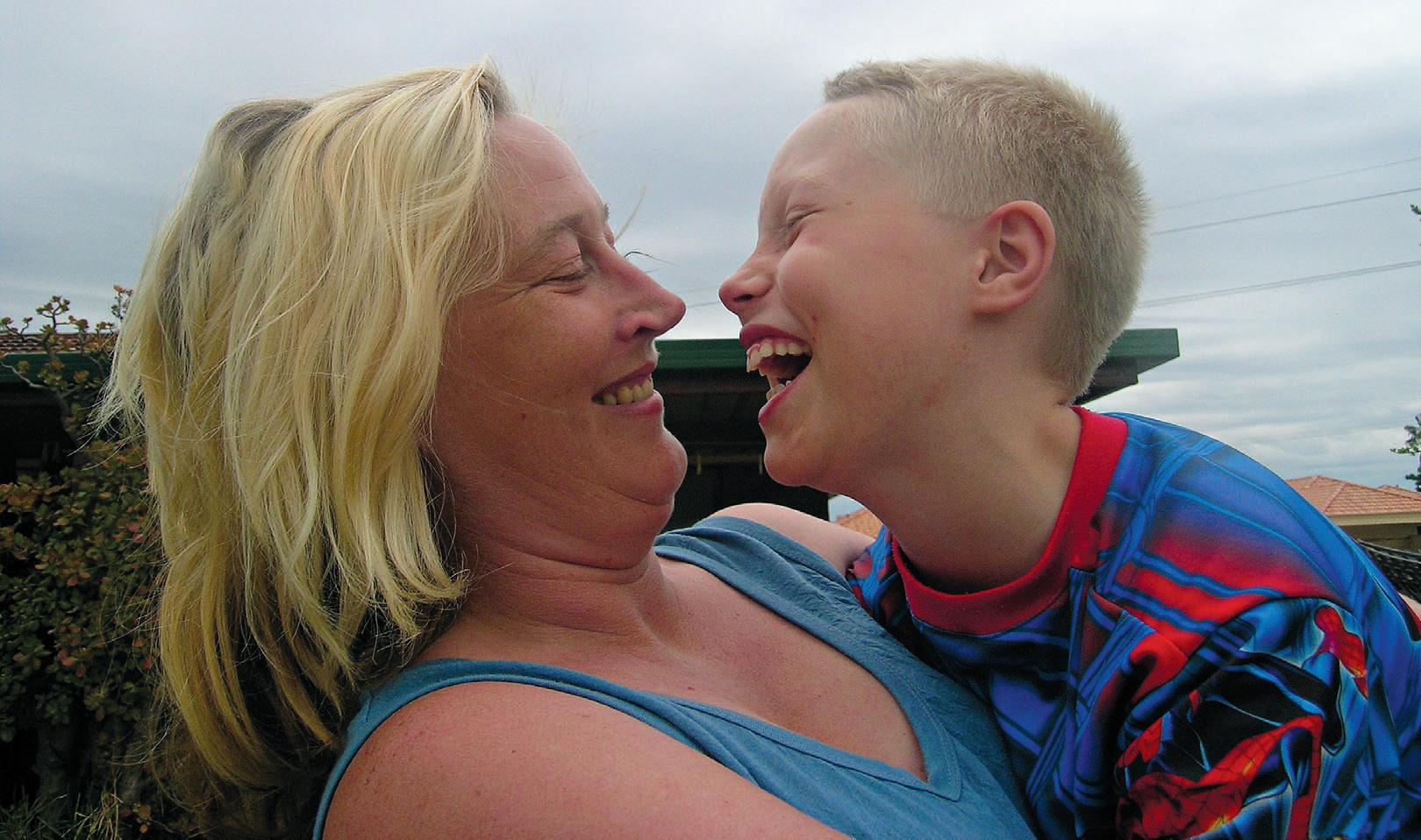
Linda’s House of Hope in Cannington, which has helped over 200 women out of prostitution and drug addiction since 1999, is on the brink of folding.
Linda’s House of Hope started when Perth Archbishop Barry Hickey bought two houses on the same street for Linda Watson, a former prostitute and crusader against the legalisation of the trade, to help rehabilitate women
Pope Benedict XVI’s visit to Turkey has displayed a mastery not only of words but gestures, observers say. Among those most impressed were the country’s Muslims.

and help desperate families affected by it.
Ms Watson’s initiative is not in the red but, on top of the $2550 a month she gets from the archdiocese, she relies on donations. She needs not just one but a regular source of money to support her work.
Ms Watson works as a volunteer, and with her occupational therapist Natalie (who earns just $200 a week), they work alone at the House of Hope. Four donated
Continued - Page 14
Two more priests have been ordained for the Archdiocese of Perth. At a time when vocations to the priesthood are low in many parts of Australia, Perth continues to ordain priests for the Church and for the world.
The two men gave their lives to Christ’s call to follow
him when they were ordained by Archbishop Barry Hickey in Balcatta last Friday.
They were more fruits of the Neocatechumenate, which, together with St Charles Seminary, has provided wonderful numbers of priests in recent years.
Full story - Page 5

Archbishop Barry Hickey has said that he would be very surprised if the Vatican changed the Church’s teaching in relation to condoms.
“I certainly hope it doesn’t,” he said.
He made the comments when approached by the West Australian on November 25, the day after the paper ran a front page story headed “Pope may allow use of condoms to protect against AIDS”.
The paper did not publish his response. He told them the main reason for his view had nothing to do with contraception.
“It is about passing on diseases,” he said. “When it comes to transmitting disease, condoms are a dangerous form of roulette, because they have a one in 10 failure rate.
“In the case of an HIV infection or any potentially fatal disease, no husband should put his wife at such a risk at any time. Nor would he ever want to. The false claims about the safety of condoms could give married couples a false sense of security. They should be warned against using them by public health officials, not just the Church.”
He added there is no foundation for the claim made by the West Australian that the Church’s teaching is responsible for “millions of deaths”. “The Church teaches people to develop the self control and

Misinterpreted teaching: Some 100,000 children have HIV/AIDS in the five-country region of Namibia, Botswana, Swaziland, Lesotho and South Africa. PHOTO: CNS/COURTESY SECURE THE FUTURE
respect for others that are required for abstinence or chastity before marriage and fidelity in marriage. Those who follow the Church’s teaching are at no direct risk of contracting HIV or other sexually transmitted infections,” he said.
(Sister (Dr) Miriam
Dugganof the Irish Franciscan Sisters for Africa was one of the founders of the abstinence before marriage and fidelity in marriage campaign begun in Uganda about 1990. When she visited Australia in 2004 she quoted a Harvard University study of the effectiveness of the program
which revealed that from the late 80s to 2001 the number of pregnant women infected with HIV dropped from 21.2 per cent to 6.2 per cent.
In Botswana, where condoms were officially promoted as the solution, 38 per cent of pregnant women were HIV positive in 2001.)
Fr John Thomas Whiting, founder of the Australian home missionary society, the Confraternity of Christ the Priest, died at Nazareth House, Melbourne, on November 20 aged 89 after 63 years as a priest.
Fr Whiting, the oldest of five children, received his early education from St Monica’s Primary School and the Christian Brothers in Moonee Ponds.
He was particularly impressed with Redemptorist priests who preached a retreat at his school and who were also made welcome in the family home. As a result, he developed a strong desire to join the Redemptorists and to preach the faith to as many Australians as possible. He completed his secondary studies at the Redemptorist Juniorate, Galong, NSW, then after his novitiate and profession of vows began his priesthood studies at St Mary’s Monastery, Wendouree, Ballarat, then ordained a priest on March 14, 1943. He preached parish missions in 13 dioceses and over 100 parishes in NSW and Queensland.
He saw the need for a spiritual and instructional outreach that could last up to 20 years. In that time, he envisaged that a complete generation would be able to receive the full teaching and spirit of the Catholic faith, so that young people would have an opportunity to be proud of their faith and to answer objections to it from their peers.
Continued from Page 1
Fr Fleming, who specialises in the development of public policy in bioethics and is a member of the Commonwealth Government’s Gene Technology Ethics Committee set up under the Gene Technology Act 2000.
“They want abortion legal, but when you ask them their personal moral views, those numbers halve.
“That’s the reason why they’re conflicted – people know the killing of the unborn is a deeply morally disturbing thing to do, which explains why it is they say ‘we want the numbers of abortions in Australia reduced by non-coercive means’.”
Those surveyed also believed that women contemplating abortion are not supported enough – by family, employers and spouses.
“There have to be better arrangements within the workforce to support women – particularly single mothers – to be able to care for their child in a way that’s consistent with having a job,” Fr Fleming said.


Fr Fleming also concluded that Australians want public debate on the issue - but they shy away from any debate they perceive as bitter in nature. Pro-life and pro-choice advocates can find common ground
to reduce the overall incidence of abortion, he says. Fr Fleming said this seems to be the best solution to reforming Australia’s abortion practices, as change in legislation regarding abortion seems unlikely in the foreseeable future.
Speaking at the 10th anniversary of Pregnancy Assistance on November 25, Fr Fleming said there was “no reason to be discouraged”, as the work done by such groups and other pro-life organisations had clearly penetrated the hearts of a significant number of Australians.
The survey also revealed that Australians reject the pro-choice argument that the foetus is not a human life.
The results of his four-stage study were submitted to Prime Minister John Howard and Health Minister Tony Abbott and are understood to have been one of the key factors in the government introducing new pregnancy support counselling Medicare Benefits Schedule items last month to help women who are concerned about a pregnancy. The MBF items will cost $35.6 million over four years to 2009-10.
See feature Vista 1 for detailed analysis and breakdown of Stage 1 of Fr Fleming’s study.

Perth Archbishop Barry Hickey is to have a full-time “other self” as of the end of January next year.
Claremont is now looking for a new parish priest as its pastor for the past eight years, Vicar General Fr Brian O’Loughlin, who is also associate Judicial Vicar of the Perth Province Tribunal of the Catholic Church, has been asked by the archbishop to be a full-time Vicar General. Archbishop Hickey has called for expressions of interest in the parish of Claremont but he has already received a “very strong application”, and says a decision must be made soon.
It marks a move which Fr O’Loughlin’, a Canon Lawyer, did not expect so soon – especially after he heard nothing from the Archbishop about moving on after his first six years at Claremont.
He will have all the executive power that the Law of the Ordinary (which includes Bishop Don Sproxton and the Archbishop) gives him plus any additional faculties that the Archbishop bestows on him.
He will continue his role at the Tribunal and lecture at the seminary, as the Perth archdiocese only sends priests to be trained in Canon Law every 10 years.
Fr O’Loughlin completed his Canon Law degree at Ottawa, Canada in 1985.
The move away from a parish community till take some getting used to for Fr O’Loughlin, who has been involved in one parish or another since his priestly ordination on August 31, 1974 through to when he studied in Ottowa in 1979.
Even when in Ottawa he lived and worked in a parish at grassroots level.
He knew he’d move on from Claremont, but not so soon.
“It will wrenching leaving the Claremont parish community, because right from my ordination on I’ve been involved in such a community. So that’s the unknown of this current transition – I have been in a parish for the past 32 years, so it’s quite a dramatic change,” he said.
“It will take some adjustment, and I’m just sad to leave Claremont, because with the people of the parish we’ve achieved so much, and the people are sad to see me go, but

they know I’m following the Archbishop’s request.”
Fr O’Loughlin has been Vicar General for three years since receiving a call from the Archbishop while “beavering away” working at the Tribunal.
Called to the Archbishop’s office, he came armed with an envelope concerning a Tribunal case about which he thought the Archbishop wanted to talk to him.
When Archbishop Hickey said he wanted him to be Vicar General, Fr O’Loughlin saw the request as “the hand of God” intervening in his life as the request had come from the Archbishop himself, his superior in the archdiocese.
In 2002, Archbishop Leonardo Legaspi, of the Philippines, was appointed by the Congregation for Catholic Education as Apostolic Visitor to the seminaries of Australia. In the course of that appointment he visited both St Charles Seminary in Guildford and the Redemptoris Mater Seminary in Morley.
Following his report to Rome, the Congregation advised Archbishop Hickey that in their opinion the one person should not hold the two roles of Vicar General and Rector of the seminary, as Mgr Tim Corcoran did at that time. It was decided that

Mgr Corcoran would continue as Rector of the Seminary, and the position of Vicar General thus became vacant.
When Fr O’Loughlin initially accepted the Vicar General position three years ago the Archbishop assured him it would not detract too much from his duties at the Tribunal and the parish, but over the past three years – in particular this past year with the renovation work done to St Mary’s Cathedral – his Vicar General role has grown exponentially.
So he wasn’t surprised when the Achbishop said that “he needs more help”, as Fr O’Loughlin put it.
“While he’s turned 70

– and he’s very active for a man of 70 – he can’t do all that he wants to do, and so the Vicar General is like the other self of the Archbishop,” Fr O’Loughlin said. His duties include a Curial Council meeting each Wednesday with the Archbishop, Bishop Sproxton and Vicar for the Clergy Fr Brian McKenna.
Archbishop Hickey said: “The Church workload increases each year and with the advent of email, correspondence has increased four-fold.
“Deskwork is not my main priority but it has become, so I thought it best for the Vicar General to handle that so I can attend to other duties.”
A parish’s 70th anniversary is not just an excuse for a party, it is a reflection of an almost untold reservoir of prayer and goodness.
This was exactly the case for St Thomas the Apostle parish in Claremont, according to Perth Archbishop Barry Hickey, who blessed the new and vintage stained glass windows which had been installed as part of the celebrations on the vigil of Christ the King.
Claremont parish priest Fr Brian O’Loughlin, who is soon to leave to take on full-time Vicar General duties, related how the Archbishop said how it struck him that such an anniversary of a church is a recognition of all the people who have been involved in the parish since the opening, blessing and foundation of the parish in 1936.
“That represents an almost untold reservoir of goodness and prayerfulness from all those people down the years, then the present generation are the beneficiary of all of that, as they have come into an established church,” Fr O’Loughlin said.
“Now it’s up to them to ensure the structure of the church building continues but also that the community and parish life grows.
“The church now is beautifully embellished, and parishioners are now saying it’s even more beautiful than they were hoping for.”
The stained glass windows are a combination of new and vintage work. The vintage work are the three windows in triptych style on either side of the sanctuary, and the new work are the windows for the four evangelists, and also four lilly panels in honour of
Continued on page 14
Do I guarantee that when people come to do business with me, they will be treated with courtesy, sincerity, professionalism and ef ciency?
I say “I want your business and I m prepared to pay for it” and “I stand behind every car I sell”. Is that really true?
Is it true that I have over 40 technicians who are dedicated to getting my used cars in rst class condition before sale?
Is it true that every year for the last 17 consecutive years
I ve been Australia s top selling Hyundai dealer?
Is it true that if somebody buys a used car from me, I will pay for a pre-purchase RAC or similar inspection?
I have a warehouse selling cars under $10,000. Is it true that I offer a full money back guarantee within one week?

The concerned faithful from three parishes, who have suffered a shortage of priests for over two months, will have to work through the challege of an impending merge.
As of Christmas this year the parish communities of Rivervale, Belmont/Redcliffe and Cloverdale will be brought together in a large pastoral area, coordinated by Fr Phillip Fleay of Cloverdale.
Perth Archbishop Barry Hickey announced the new pastoral area in his Ad Clerum (letter to priests), on November 24.
Former parish priests Fr Eugene McGrath (Belmont /Redcliffe), who is now chaplain to the Little Sisters of the Poor in Glendalough and Fr Eamon McKenna (Rivervale), who is presently a resident at St John of God Villas in Subiaco, both retired during October this year.
St Maria Goretti’s Mass Centre, St Anne’s Church in Belmont, and St Augustine’s Church in Rivervale were then serviced by Fr Andre Nahas, who was appointed to oversee the parishes.
And, while parishioners have suffered a shortage of priests during the last couple of months, Fr Fleay said the decision to amalgamate the parish communities was by no means a result of too few priests.
He said it was a case of ensuring smart use of Church resources to best service the faithful throughout the State.
“With barely 1000 people in total amongst all three parish communities, it is a case of looking closely at the numbers, at the proximity of the churches and at the best way to share resources amongst the
whole state,” Fr Fleay said. Inner suburban churches were built so that “no man would have to walk further than a mile to get to Mass”, explained Fr Fleay.
These days, however, the close proximity of churches in this particular area allows for resources to be shared quite easily. All three churches and the one Mass centre lie within barely five minutes of one another at present. Communities also have the opportunity to venture slightly further for Masses at St Joachim’s pro-cathedral.
Locally, there have been concerns by worried parishioners who have not been given answers to the priest shortage up until the recent announcement.
And while there are parishioners who will be disappointed to learn of the amalgamation plans, Fr Fleay, who is a veteran when managing parish amalgamations, believes parishioners will, in time, realise the benefits.
Originally from Queensland, Fr Fleay says he is used to dealing with single-parish communities as large as 1500 each weekend.
But he will not be alone in ministering to this new parish. Assisting Fr Fleay in managing the three parishes and their respective primary school communities will be Fr Nicholas Nweke, who will leave Willetton parish to act as assistant priest.
Fr Nahas will go on to assist Fr Tony Vallis in Girrawheen.
Meanwhile, Fr Richard Rutkauskas, who has just returned from a period of rest and recuperation, will become assistant priest at Sts John and Paul Church in Willetton.
Fr Fleay told The Record that he has every confidence in Fr Nweke, and that he looks forward to bringing together the wider parish community.
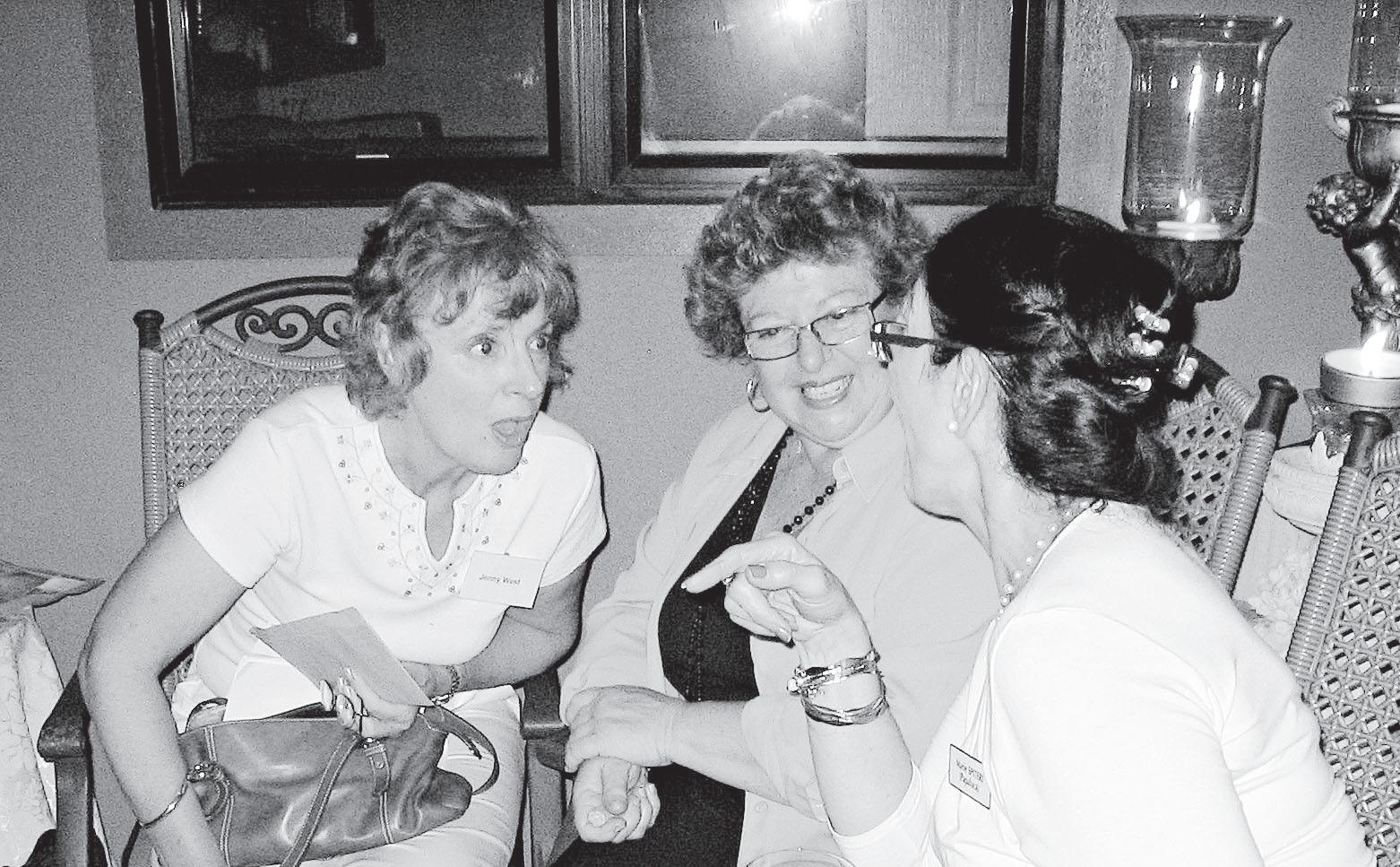
After two years of playing the ‘detective,’ Aranmore Catholic College old-girl Patricia Hegney accomplished what seemed impossible for the junior class of 1962 - a school reunion.
According to Mrs Hegney, the college did not have a single record of those who frequented the school at that time, providing a formidable task when trying to locate past school friends.
“The college didn’t even have a list of names. I had to think back to who sat where in year 10, trying to recall each girl’s name,” she said.
Mrs Hegney has spent the last two years searching for leads in phonebooks, knocking on doors, advertising on local radio station Curtin FM, and in Community Newspapers, in an attempt to bring all her classmates back together one more time.
“While we were at school, Aranmore College was an all-girls school, which made it very hard to locate women whose surnames had changed,” Mrs Hegney commented.
Yet, Mrs Hegney managed to locate and contact over 30 women, whom she found in London, Papua New Guinea and across the state of Western Australia.
One woman was only contacta-
ble through a sister and the two were no longer on speaking terms, but Mrs Hegney’s mission to contact old friends essentially bridged the family rift.
Initially named Arranmore College, the school changed its name to St Mary’s College in 1933 and maintained the name when a new building was erected on the original site in 1953.
Mrs Hegney’s year one class were the very first to start their schooling in the new premises and most continued their schooling at the College until the end. As the years passed Mrs Hegney would frequent College anniversaries and functions only to discover how poorly represented her class was.
After much tracking and with as many re-claimed classmates as possible Mrs Hegney hosted her own reunion, 44 years after the class dispersed in 1962.
“I had known some of these ladies since kindergarten, yet for some reason hardly any of us had really kept in touch,” she said.
Thirty ladies turned up to Mrs Hegney’s residence on Friday November 10, for a night of reminiscing and shared experiences of strength, weakness and general school life as it was under the care of Mercy nuns.
While Mrs Hegney admits some were quite nervous at first and that not one managed to recognised
another, “once conversation picked up, it was as though 44 years just melted away and suddenly we were all 15 again.”
The ex-students shared their personal stories of heartache and happiness and mused over having shined shoes and clean nails, which the sisters would check daily.
“Normally, I expect reunions focus on an ex-student’s job, spouse or income, but that was not us. We were just excited to see one another and to look back and laugh at the good times and the bad,” Mrs Hegney recalled.
Armed with a spreadsheet of names and contact details, Mrs Hegney is convinced that this time the old-girls will keep in touch on a more regular basis.
“Ideally I would love to enjoy annual reunions, though, having said that, the next one will never be the same as that which we all experienced recently,” she stated. Of the current Aranmore College, Mrs Hegney, says she still feels a strong bond with the school, even though it has changed so much since she was a student; and plans to submit copies of memorabilia to the school in an effort to fill the void in records.
And as for the life-long friends once again reunited, Mrs Hegney said that while their bodies had changed, their hearts and souls remained the same.
A column titled “A season overgrown by excess” appeared in a recent issue of the San Diego Diocese’s The Southern Cross newspaper written by its editor, Cyril Jones-Kellett.
What is Advent? Is it mini-Lent? Are we supposed to give something up? Are we supposed to do something extra?
That’s the funny thing about Advent: We know it’s there, but many of us are not sure what it is, exactly, or what we are supposed to do with it. The secular world calls this time “The Holiday Season,” or
- more accurately - “The Holiday Shopping Season.” And the secular world knows exactly what to do: shop, party, wrap things, watch holiday specials, eat.
All of which is an enjoyable way to mark the fading of the warm months and the nestling in for the cold. But perhaps we have the nagging feeling that there is something else we should be doing as we prepare for Christmas.
Part of that nag is certainly the fact that the highly commercialised festivities can overwhelm our efforts to observe the religious nature of the season. But perhaps another part is that we misunderstand Advent.
Here’s what the Church’s General Norms for the Liturgical Year and the Calendar has to say about
Advent: “Advent has a twofold character: as a season to prepare for Christ when Christ’s first coming to us is remembered; as a season when that remembrance directs the mind and heart to await Christ’s second coming at the end of time.
Advent is thus a period for devout and joyful expectation.”
This norm was promulgated in 1969, after the Second Vatican Council. Before the council, Advent was indeed thought of by most as a mini-Lent; it was a time to do penance and prepare for the coming of the Lord. Even today, the Eastern churches call it the “little Lent.”
And, of course, any preparation for the Lord requires a turning away from sin. Every part of the Church’s life includes a recognition that we must turn away from our bad habits
and turn more completely toward God.
So there is a penitential aspect to Advent.
But it is not the key attribute of the season.
Instead, the Church chooses to emphasize remembrance, joy and expectation.
Speaking last year about Advent, the Pope said that it should be marked by two attitudes: “vigilance in prayer” and “exultance in praise.”
Our exemplar of this season, is, of course, Mary, the mother of Jesus.
With Joseph she celebrated the first season of waiting for the Redeemer child.
Advent is, therefore, a time to remember the virtues of Mary and to learn from them - her patience,
her trust, her strength, her love for the Christ Child and her nurturing of him within herself.
Advent is a time to walk with Mary so that we can hold with her the Christ Child.
Are we, too, letting the life of Christ grow within us? Does the growing of that life bring us joy? Do we nurture it? And are we waiting for him, as she waited for him?
Perhaps Advent is difficult for us because we are results oriented; we are not oriented toward waiting, toward simply loving the Lord who grows within us.
But that is all Advent is: to wait joyfully, expectantly - both for Christmas and for the fulfillment of God’s promise to us for life eternal with him, for a new heaven and a new earth.
It is with a spirit of gratitude to Jesus Christ that Spaniard Jesus Bello and Nicaraguan Luis Tijerino were ordained Catholic priests by Perth Archbishop Barry Hickey at St Lawrence’s church, Balcatta on December 1.
The two graduates from Redemptoris Mater Missionary Seminary have both returned to the Church through the Neocatechumenal way after suffering confusion and disenchantment during their youth.
“The best thing is that they come with a sense of gratitude,” Redemptoris Mater Seminary rector Fr Michael Moore said.
“They’ve seen, through the Neocatechumenal way, that Christ has really helped them, and it is with that spirit that they will offer their life in the Church as missionary priests.”
Both Fr Tijerino, 27, and Fr Bello, 33, had their families present – Fr Bello even administering his first Eucharist to his mother Maria.
“When I came out of the church I had to pinch myself, especially when I think about all the things that fell into place for this moment to happen, and I find myself thinking, ‘is this for real?’,” an awestruck
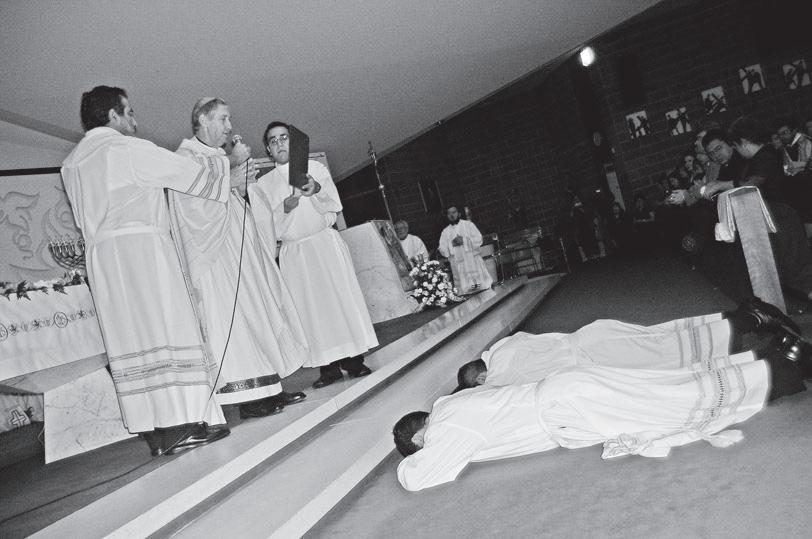
Fr Tijerino said immediately after the ceremony.
“If you’d told me before my vocation that I would live this moment, I would’ve thought you were mad.
“When I was a kid I used to see the priest standing so still all during Mass, I used to think ‘there’s no way I could do that’.”
Fr Bello, born in Burgos, Spain where incidentally many of the monks of New Norcia were from, landed in Sydney for the beatification of Mary MacKillop.
After receiving a Bachelor of Theology from Notre Dame, he earned his Masters of Theology
from the Catholic Institute of Sydney and helped start a seminary in Sydney. Fr Bello has not felt daunted by being away from his home country and family.
“God has given me hundreds of mothers, fathers, brothers and sisters, so I am perfectly happy here in Australia,” said Fr Bello.
Fr Bello felt the call to the priesthood after hearing Pope John Paul II preaching at the World Youth Day at Santiago de Compostela in Spain.
He then spent a few years in the pre-seminary in the parish in Burgos. He left University after
Perth’s newest priests tell of how they overcame confusion during youth to rise to the priesthood through the Neocatechumenal way.
Luis Tijerino
My name is Luis Tijerino and I was ordained to the presbyterate along with Rev Jesus Be lo on December 1.
I am 27 years old, I was born in Nicaragua and am the eldest of eight.
This is my eighth year in Australia.
My family are Catholic and were going to the Church, but not long after I was confirmed I lost interest in the Church. I wanted to enjoy my life and looked for other things which were more relevant for me.
About the same time as this a catechesis for youth and adults was offered in my parish and I went to listen with my brother. I was 13 and I was amazed to hear that Jesus is a person and not just a collection of do’s and don’ts.
This was good news for me.
Going to the Neocatechumenal Community of my parish and listening to the Word of God made me think about what I wanted to do with my life.
Here my missionary vocation was born.
I enrolled in a vocational centre and by the end of high school I asked the Church to help me see how God was calling me to spend my life.
I got chosen to come to Perth and now eight years later, through all my problems and crises, I can say yes to the call of Christ because he has been with me along with my community in Nicaragua and my community in Mirrabooka with many other people to help me. I do not know where God will take me but I cannot wait to flind out.
Jesus Bello
I am Jesus Bello from Burgos in the north of Spain, 33 years old and with two sisters. The Church played an important part in the life of my family. I was an altar boy serv-
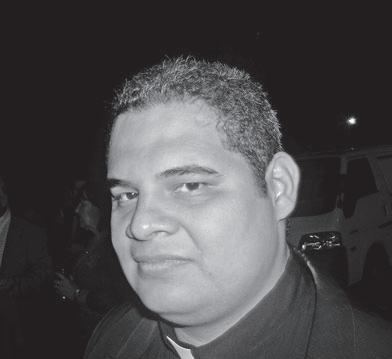

ing at a convent near my home. The nuns asked us what we wanted to do when we grew up. I don’t remember my answer but they had prayed for me to become a priest.
As a teenager I suffered a lot and was confused about God, who I thought loved only the good people.
I was proud, rebellious and destructive.
Through my Neocatechumenal parish community I discovered who Jesus Christ really is.
Leaving school I began to study engineering. But experiencing this love of God I felt a call to proclaim this love to others.
I left the university, my family and my country and was chosen for Perth.
After time here in Perth and Sydney as well as time in New Zealand and Ecuador, the Church has called me to ordination.
I can answer “Yes” because in these years in Australia I have seen God’s hand on me, helping me with my studies, my life and with the work of evangelisation.
I rely on God’s mercy and your prayers.
completing the initial year of a Bachelor of Electrical Engineering degree making himself available for the new evangelisation to go anywhere in the world to be prepared as a missionary diocesan presbyter.
While in formation he has announced the Gospel in Darwin and in Broome in the parish of Beagle Bay/Lombardina and spent a year in Ecuador in a team announcing the Gospel.
His family and some of the brothers and sisters of his Neocatechumenal Community of the parish of San Julian in Burgos attended his ordination, plus his uncle, a missionary priest, and his retired parish priest have both come.
He has spent the last six months as a deacon with the Salvatorian Fathers in the Parish of St Lawrence, Balcatta. He is incardinated in the Archdiocese of Perth.
Fr Tijerino, from Managua in Nicaragua, commenced seminary studies in Perth in 1998 where he completed a Bachelor of Theology degree.
He initially felt the call to the priesthood aged 17 while helping some Missionaries of Charity who were preparing children from a very poor area to receive the sacraments. This call was confirmed in a vocational meeting in 1996, and he
made himself available to go anywhere in the world to be prepared by the Church to become a missionary diocesan Presbyter available to evangelise whereever the needs demanded.
During his formation he worked in the Aboriginal Mission of Daly River in the Northern Territory for over a year learning some local languages.
His parents and the team of Catechists of the Neocatechumenal Way of Nicaragua also attended his ordination.
Redemptoris Mater Seminary has received four new seminarians, bringing its total to 23, from 12 nationalities – with Giovanni Raffaele from Messina, Italy; David Nieves from Valledupar, Colombia; Moises Arace from Managua and Rodrigo Tomala from Brazil.
Fr Moore said he hopes to see them in Perth by the end of next month.
This year, five of Redemptoris Mater’s seminarians have been itinerant: Benny Calanza in Humpty Doo (NT); Marcello Gonzalez, first in Daly River and now in Canberra; Matteo Galante in East Hampton and Victor Lujano in Wollongong and Adelaide.
Mauricio Villamil is in Colombia in a team working in parishes announcing the Gospel.

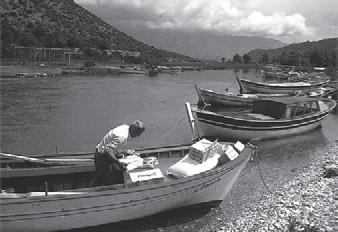

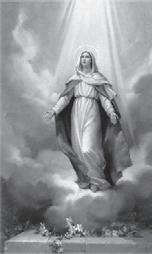
It is a subtle but effective evangelisation that the new chapel of St John of God hospital in Subiaco brings to patients.
Traditionalists may balk at the modern design, which is bereft of anything we would associate with conventional Catholicism like Byzantine icons, Renaissance art or even stained glass windows, but look closely and you’ll see it.
There are two chapels – a large one, in which a modern sculpture of what local artist David Walker called the “risen” Jesus looks over the congregation, and a smaller, more intimate and private chapel, which has an “embracing” Christ with his hands bending inwards as if to embrace the ill patients who go there for prayer or peace.
A wooden design at the front of both chapels has three overlapping white circles which are both Eucharistic and Trinitarian.
The chapel itself has made a lot of things possible. Cameras in the main chapel ensure every ceremony, every Mass is broadcast into every room in the hospital, making it an ideal tool for evangelisation.
It will also enable a Vigil Christmas Mass to be said in the hospital for the first time.
For example, to open the Advent season, pre-primary children from Liwarra Primary School in Greenwood were to perform a nativity play as part of a ceremony that involves the blessing of the
Crib, so everyone can tune in. The chapels were part of the hospital’s $100 million redevelopment.
It all started when the hospital’s former chief executive Les Fong, a lay preacher in the Church of Christ, voiced his concerns that the hospital should be publicly stating what it is – a Catholic hospital.
He initially wanted it in the most conspicuous spot – facing Cambridge Street, but once the task fell to the hospital’s Director of Mission Anne Fox and a planning group was formed including consulting St John of God Sisters Eugenia Brennan and Petrus Enright, another practical plan was formed.
Anne Fox, a former Sister of Mercy for 17 years in Adelaide and ex-director of Pastoral Planning in the Archdiocese of Perth, also lectured in theology at Edith Cowan University. So she knew a thing or two about the Catholic faith.
The two Sisters and herself spent half a day briefing the artists of the chapels about the importance of the Cross to the faith, and, as Mrs Fox said, “They got it right exactly.” And none of the artists was Catholic. She also says the Masses in the chapel attract Catholics and non-Catholics.
“I have to say, feedback has been overwhelmingly positive, though it is minimalist – designed for people who are ill and in hospital, regardless of denomination or faith,” Mrs Fox said.
The theme was that the chapel should be a structure which patients,
Religious leaders representing 3000 Catholic nuns have pledged their support for Indigenous people on the 20th Anniversary of Pope John Paul II’s address to Aboriginal and Torres Strait Islander people in Alice Springs.
The Sisters of St Joseph and the Sisters of Mercy throughout Australia have resolved to stand with Aboriginal people in their struggle for basic human rights.
Sr Katrina Brill, a Congregational Leader of the Sisters of St Joseph speaking in conjunction with Sr Caroline Ryan, Vice-President of the Institute of Sisters of Mercy of Australia said “Sisters across Australia work in partnership with Aboriginal peoples in remote, regional and urban communities, at the coal face, in policy think tanks and in advocacy networks. They say that despite the best efforts of many, very little has improved in the last twenty years. Aboriginal people still suffer extreme rates of disadvantage on any current socioeconomic scale and their communities’ rights to self determination can still be over-ridden.”
Speaking on behalf of both Religious Orders, Sr Katrina Brill said “In his address twenty years ago today, Pope John Paul lamented that a just and proper settlement of Aboriginal rights had not been achieved. He spoke of the right to culture, to a livelihood, to education and to spirituality.
“In particular he recognised the connection between Aboriginal
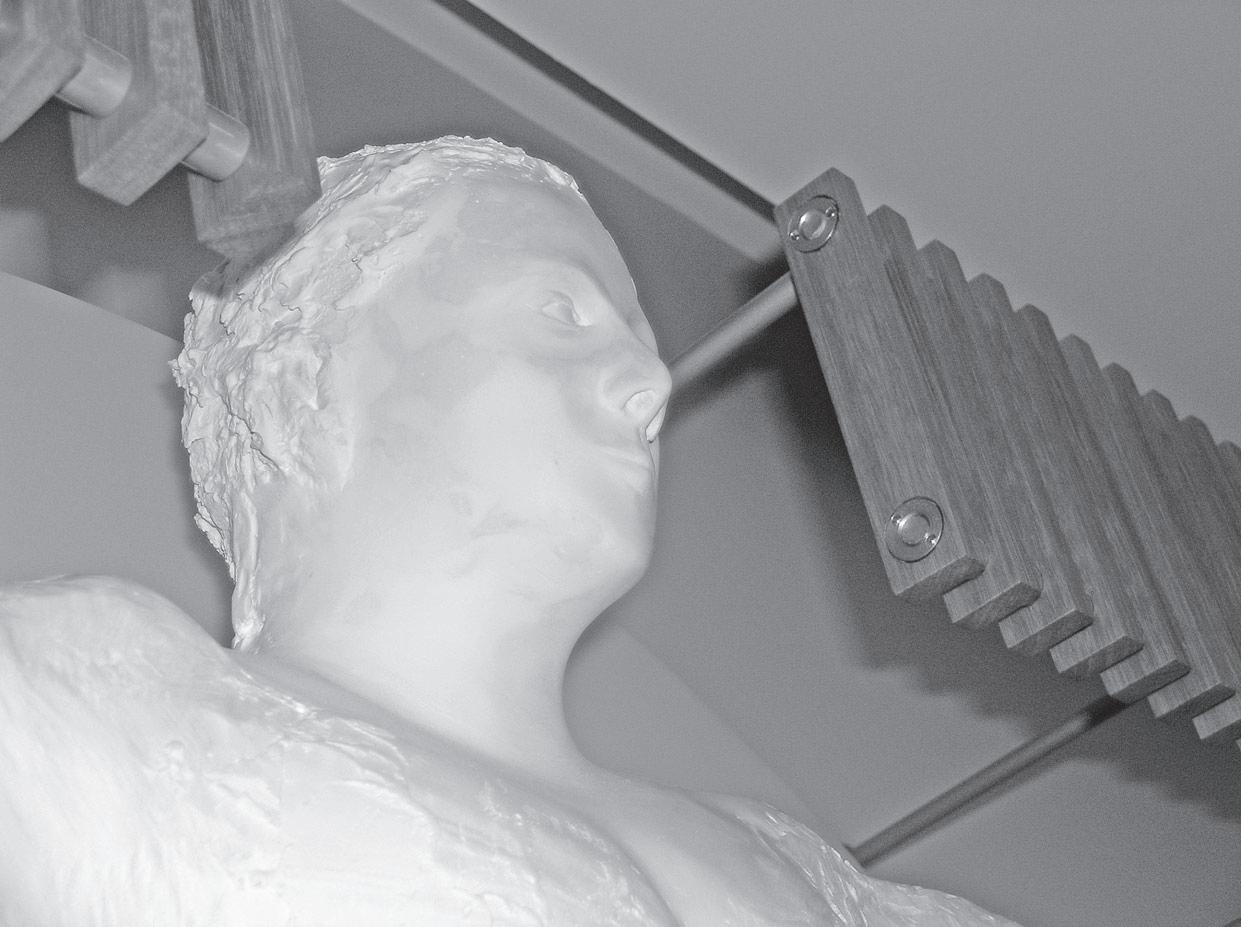
their families and staff experienced as a place of refuge (hence the main chapel is round), to be a safe place and one of “prospect” – a term so used because one side is glass which opens up to the outdoor landscape and sky in a way that gives hope and uplifts.
The main chapel is used both by those within the hospital and
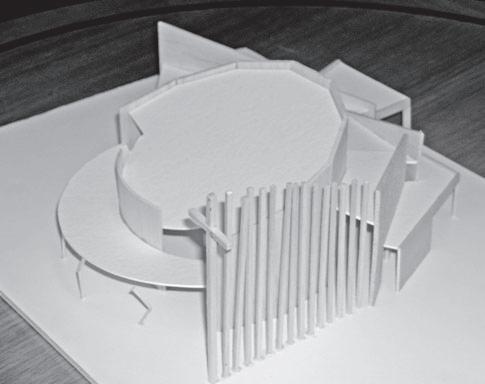
people and their land. He emphasised a right to land, a right that the first peoples of this country have never surrendered.
“With regard to issues facing the Australian community today, the Pope’s call for ‘fair and equitable recognition of Aboriginal right to land’ is particularly pertinent to aspects of the current implementation of the NT Land Rights legislation. The invitation to sign 99 year leases on land that the Aboriginal people already own, poses a threat to basic rights. We appreciate that this is a complex issue requiring specialised knowledge, but there continues to be worrying reports from places like Wadeye, Galiwinku and Tiwi Islands about the implementation of the legislation.
Some traditional owners, who do not have access to legal documentation and for whom English may be their fourth or fifth language, feel pressured to make hasty decisions, and feel they are not fully informed of the implications of the choices they make. Reports suggest some even feel pressured to sign a lease in order to receive essential services such as additional housing, improved education and health services.
“Where there is unequal power, there is extreme danger of coercion,” Sr Katrina said. “In working towards a truly reconciled Australia, we want to ensure that Aboriginal communities and their elders can freely make decisions about matters that affect their livelihood.”
ecumenically. The smaller chapel is one of Repose – it is where the Blessed Sacrament is kept.
Yet to be built is a water feature that connects the hospital to the chapel, with all the imagery and symbolism that water has in Catholicism. An extended Cross and window is also to be put in place, with 14 Stations of the Cross
represented outside. All liturgical furniture was developed as part of a tender process, which local artist Mr Walker won. The contract attracted notoriety in the art community as it was a large commission.
But the liturgical furniture and artwork are yet to be completed, so donations are still needed. Contact Anne Fox for donations on : 9382 6111.

Parishioners of St Patrick’s Basilica in Fremantle were treated to the organ sounding and almost 100 voices chanting at their weekly 5pm Mass on Sunday November 18.
Celebrating an annual event, which fosters traditional Church music, choirs from St Mary’s Catholic Cathedral, St George’s Anglican Cathedral, St Patrick’s Catholic Basilica and Wesley Uniting church gathered to share their talents with the Fremantle parishioners.
Organised through the international Royal School of Church Music, the opportunity for acclaimed choirs to join in celebration of a religious service rotates annually amongst the churches involved.
The Basilica was gifted with this opportunity for 2006, which saw the group reciting one of Mozart’s greatest works, the Coronation Mass.
Each choir prepared separately, weeks before the
event, joining for rehearsals closer to the date of delivery.
Director of music and organist, Domenic Perissionotto was chief organist and conductor on the day and was assisted by Simon Lawford, director of music at St George’s cathedral.
Attending her third annual choral festival, St Mary’s Cathedral organist, Jacinta Jakovsevic said it was interesting to see the difference between the young who were experiencing such communal singing for the first time and those who were older and much more experienced.
“Perhaps most intriguing is the ecumenical nature of this event. Having to rotate venues each year allows each person involved to experience diverse religious services under the Christian banner,” Ms Jakovsevic said, adding that the event allows musical directors, organists and choirs to catch up on the year that has passed and on the flourishing talent WA has to offer.
For further information visit www.rscm.com.
The perceived irrelevance of the Church to modern life, the poor quality of homilies and personal problems with Church teachings are among the reasons given why many people have ceased to attend Mass, in a special report commissioned by the Australian Catholic Bishops Conference.
At their plenary meeting in Sydney last week, a summary report from the bishops’ Pastoral Projects Office was tabled and discussed.
The report referred to extensive interviews with 41 people aged from 29 to 74 who have recently participated in a qualititative research project with the Office.
The major findings of the study were that a large majority of participants believe that the Church is out
of touch with the current world and is not relevant to their lives.
Another major finding is that in general, participants’ alienation from the Church has been a gradual process in which changing attitudes to Church teaching have interacted with “negative personal experiences of Church personnel and regulation.”
In an important supplementary finding, the project discovered that many participants displayed a very poor knowledge of the Catholic faith. “When asked whether they agreed with the Catholic position on a particular issue, many said they did not know what the Catholic position was,” the bishops found.
“Others expressed disagreement with specific Church teachings, despite having only a very hazy idea of what those teachings entailed.
“Nuances in Catholic thought -
for example the distinction between condemnation of homosexual acts and compassion for the homosexual person - were often completely missed.”
However the study also found that a number of participants were theologically well-educated and articulate. “These people were often disenchanted with what they saw as the Church’s failure to implement fully the reforms of the Second Vatican Council.”
At the end of last week’s plenary meeting, the bishops announced that they welcomed the study, saying it provided them with “valuable insights into the reasons why some Catholics no longer attend Mass and take part in the sacramental life of the Church. Together with our own pastoral experience and in the context of the broader cultural situation, we will use this study to
help chart a path forward.” Other reasons given in the study for people ceasing their attendance at Mass included inter-personal problems with a parish priest, disillusionment in the wake of sexual scandals and “cultural and societal factors which meant that Mass was no longer a priority.”
Half the respondents said they still attend Mass occasionally and almost one-third said they might return to weekly Mass attendance in the future. The study’s authors said it was important for virtually all participants that they nurture “the spiritual dimension” of their lives.
“It seemed that all it would take to get several participants to return to regular Mass attendance, or to at least give it a try, was a warm personal invitation,” the study’s authors wrote.
Also at the Australian Catholic
Bishops Conference Plenary Meeting, Apostolic Nuncio Archbishop Ambrose De Paoli said the faithful must be prepared and equipped to live their faith by the provision of sound education in both schools and in adult life.
“The Catholic school is very much a part of instructing in the faith, although not the only one,” he said. “You have an enviably extensive, strong and justly esteemed system of schools in Australia which serves the Church and Society. To keep it so, a periodic re-visit to its fundamental double challenge is necessary.”
He recalled the recent National Catholic Education Commission conference which asked those involved in Catholic education the twin questions of “How are we doing? And what should we be doing?”
It was appropriate that Archbishop Barry Hickey celebrated the Emmanuel Centre’s 25th anniversary Mass under a few pergolas that cofounder Fr Paul Pitzen had bought for $30 each at WA Salvage’s closing down sale.
A gusty wind tested the sandbuckets that held the pergolas legs in place during the Mass at St Francis Xavier Primary School last Sunday, but they held firm – just like the Emmanuel Centre.
The Centre has survived on the skin of its teeth, and God’s providence, since Archbishop Launcelot Goody gave co-founders Barbara Harris and Fr Paul the abandoned and vandalised St Francis Xavier Primary School to base their operation in 1981, the International Year of Disabled Persons.
As the co-founders tell it, virtually nothing was being done in the Church – or society, for that matter – to include disabled persons in everyday activities so many of us take for granted.
In the Church, that included Mass and the sacraments. The Emmanuel Centre – Emmanuel meaning ‘God is with us’ – was designed not as
an institution where employers dealt with clients, but where disabled people and their families helped each other in an inclusive, participatory community. Barbara, at the time a lecturer at the Catholic Pastoral Institute which trained teachers, only ever planned to be co-ordinator for no longer than three months.
Laughable problems with lack of funds to fix basic things like the photocopier made Barbara question whether there was any point in continuing on with this organisation.
But the third question in Breaking Down the Barriers – a discussion booklet put together with the late Fr Jim O’Brien, triggered a life-changing experience for Barbara.
The question read: “Do you (the disabled person) want someone to talk to about your life within the Church?”
It was then that, in the responses, she heard the stories of people’s experiences in the Church – and how isolating they felt.
Kids with disabilities weren’t being accepted into Catholic schools (or public ones either), but what irked Barbara was the lack of leadership shown in this area.
So it was at a meeting at St Francis Xavier Primary School, attended by about 100 people, where the decision
A continuation of the current situation whereby David Hicks is detained without trial at Guantanamo Bay is “not acceptable,” the Australian bishops declared at the end of their latest plenary meeting last week.
Hicks is an Australian citizen who was captured in Afghanistan and held by the US military since December 2001 but was not charged until 2004.
The bishops issued a brief statement reiterating that Mr Hicks had been detained without trial since 2001 with no ability to contest the accusations against him.
“There is now heightened concern for his physical and mental health in conditions which reputable human rights agencies have said are tantamount to torture,” the bishops said.
The bishops called for the Australian citizen to be given a prompt and just trial or returned to Australia.
“Australia has a duty as a member of the world community to uphold standards of justice and decency.
“Historically Australia and its allies have a proud record in supporting these principles both within and outside their borders,” the bishops said.
When Hicks, born in Adelaide, was captured it was asserted that he trained in al-Qaeda camps, guarded a Taliban tank at Kandahar airport and travelled to Konduz in northern Afghanistan to join Taliban engaged in combat against US-led forces.
It was also alleged he intended to kill coalition combatants in Afghanistan between September and December 2001, and that he aided al-Qaeda and the Taliban in the context of armed conflict.
to form the Emmanuel Centre was born. It was held under candle-light as the lights went out – typical of the struggles the organisation has gone through just to stay alive.
But as Barbara says, their reliance on providence and God’s help actually enhanced the faith of those involved. Despite the success of the organisation, both Fr Paul and Barbara hope to witness the self-destruction of the group: Because if those within the Church, including schools and parishes, operate the way they professes to by accepting people with disabilities without making it a charity case, then there should be no need for the Emmanuel Centre.
Barbara says acceptance and facilities for people with disabilities, both in the Church and society, are better than in 1981.
As St Paul told the Corinthians: “The body is a unit, though it is made up of many parts; and though all its parts are many, they form one body.
So it is with Christ.
For we were all baptised by one Spirit into one body.” So should this credo apply to the way the Church, and indeed society, should operate – as Barbara says: ”We should look after each other as a matter of course. I’ve been told it’s naïve and simplistic, but so is Jesus’ message.”
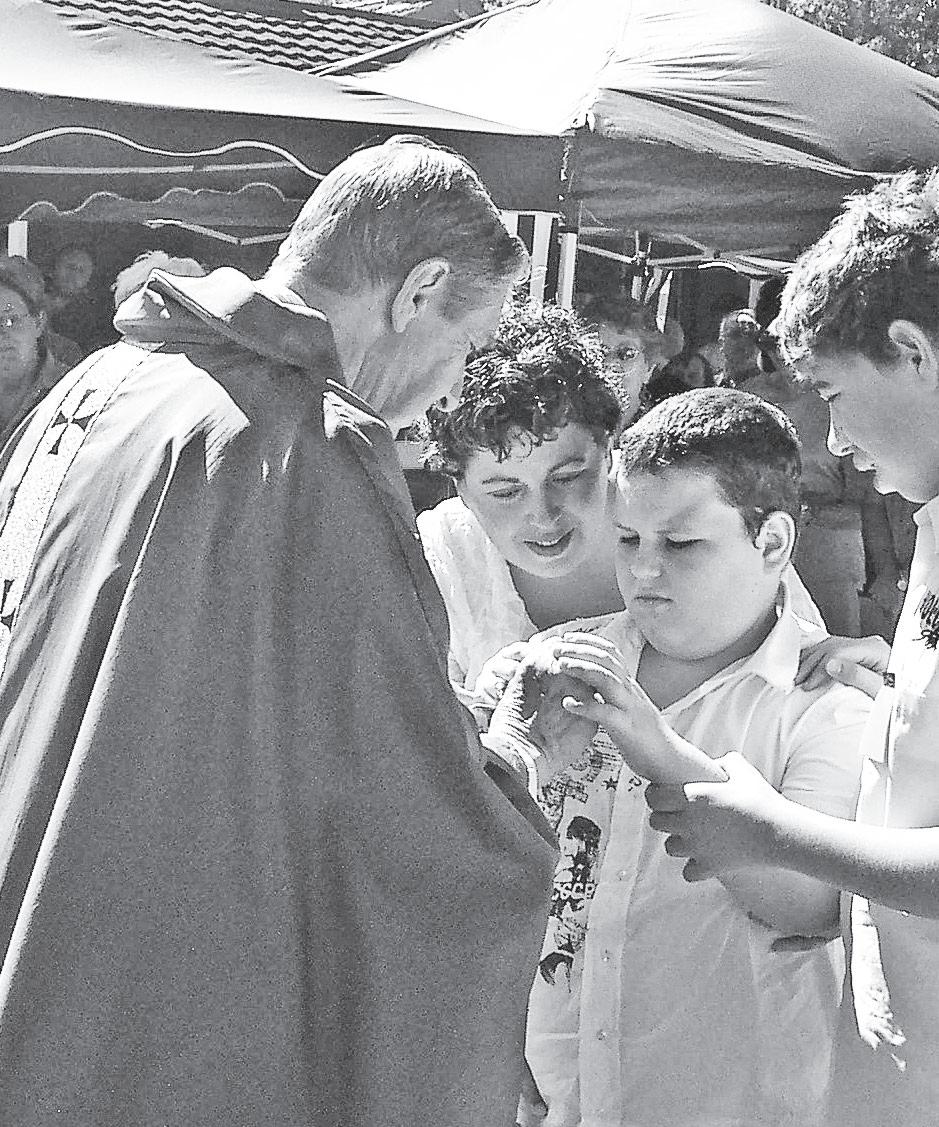
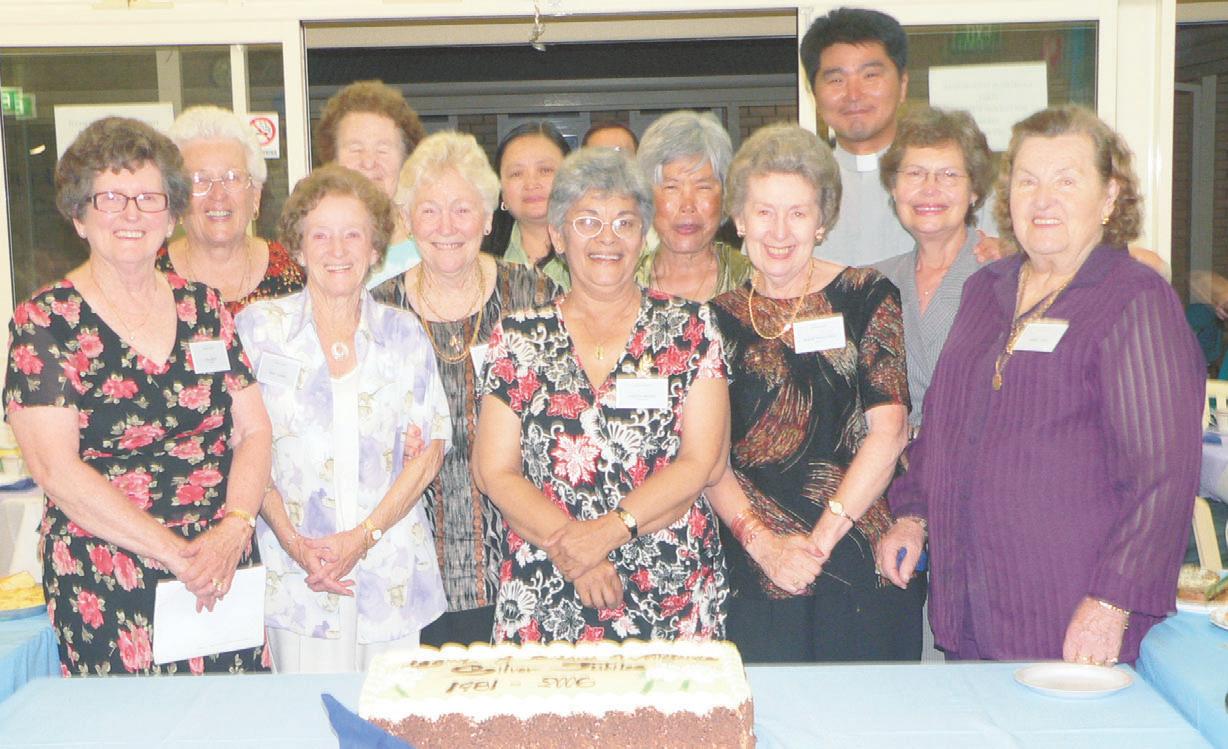
It will be interesting to see whether the election of Kevin Rudd as Federal leader of the Opposition will lead to another excess of journalism about the seriously misunderstood principle of separation of Church and State. Mr Rudd has labelled himself very specifically as a Christian and has been active in trying to get the Labor Party to consider values, including Christian values, in its understanding of policies.
On the other hand, Mr Rudd is labelled a left-winger so there may not be an outburst because so far it seems to be only right-wing politicians and/or Christians who need to brought into line by the separationists.
In preparation for a phoney religious war in lieu of intelligent political debate, it is worth knowing precisely what the Australian constitution says on the subject:
Article 116. The Commonwealth shall not make any law for establishing any religion, or for imposing any religious observance, or for prohibiting the free exercise of any religion, and no religious test shall be required as a qualification for any office or public trust under the Commonwealth.
That’s it. The Government shall not establish a religion, impose a religion, suppress a religion, or favour any religion or irreligion.
In its preamble, the constitution describes the people of the States of Australia agreeing to form the Commonwealth as “humbly relying on the blessing of Almighty God”. There is no constitutional reason for anyone to stop doing that. However, the constitution does not even countenance the possibility that any religion might have any control over the government.
In the century of democratic government since the Commonwealth was established, the most serious challenge to any of the principles of Section 116 has been to the last of them, “no religious test shall be required as a qualification for any public office or trust under the Commonwealth”.
PO Box 75, Leederville, WA 6902
Tel: (08) 9227 7080, Fax: (08) 9227 7087 cathrec@iinet.net.au
We saw it here in Western Australia in the early 80s when Keith Wilson, a Catholic, was Minister for Health. With HIV/AIDS newly arrived in the world, Public Health officials advised an all-out campaign to promote the wearing of condoms. Mr Wilson, a wiser man by far, determined that the young people of this State deserved better education from their elders and their official institutions, and therefore required the creation of a program that advised them “It’s OK to say NO.”
For this moral wisdom and courage Mr Wilson was roundly condemned in many quarters. The West Australian editorialised that because he was a Catholic Mr Wilson was not qualified to be Health Minister. The separation of Church and State did not seem to matter at the time, nor does it seem to matter to many people who attack Federal Health Minister Tony Abbott for the same reason.
History has proved that Mr Wilson was right. The only programs successful in reducing HIV/AIDS infection rates – and particularly the infection rates of pregnant women – in areas where the disease is an epidemic are those promoting chastity before marriage and fidelity in marriage. Sadly, history will also record that even now too many people have too much of their ego wrapped up in condoms to be able to acknowledge the truth of this.
Only last month, the West Australian repeated anonymously on its front page the unfounded assertion that the Catholic Church’s views on condoms have caused “millions of deaths”. The paper has not been known to declare that the failure of pro-condom policies, the failure of condoms, or the failure of casual acceptance of promiscuity have led to any deaths at all.
Apart from the constitutional issue of ‘no religious test’, it should also be observed that one doesn’t have to be a Catholic to arrive at the entirely rational and evidence-based realisation that blind faith in condoms has been a spectacularly inadequate response to the world’s worst sexually transmitted disease.
The point is that all arguments are entitled to be aired in the public square, in ministerial offices, in Cabinet, and in Parliament. They ought to be assessed rationally, preferably based on a reasonable understanding of human nature and of the working of human society.
Christians, who rightly demand equal status with atheists and the irreligious in this society, should also be aware that being a Christian offers no guarantee of superior knowledge or understanding about how to administer a modern society.
Julius Nyerere was the founding president of Tanganyika (now Tanzania) and served in that position from 1964 to 1985. He was a very good man and the cause for his beatification is now in progress. However, he was not a very good politician and he himself eventually admitted that his economic policies and his vision of an African social state failed and led to much hardship for his people. Should he ever be declared Venerable, Blessed or Saint, it will be an affirmation of his life, not his politics or economics.
We should all be able to remember this – and our constitution – as we assess people and policies on their suitability for the task at hand.
A child in the womb is definitely not the place to be if the Bracks Government goes ahead with its proposal to remove all legal protection for unborn children. Wild ducks will have more protection in Victoria.
Abortion is already freely available and widely practised in this state, because of the failure of successive governments to enforce the law (one in every three live births).
Section 10 of the Crimes Act 1958 makes it a crime to abort a child capable of being born alive (28 weeks is the deemed limit).
However it is clear babies can be born and survive at much earlier stages of pregnancy.
Neonatal wards are full of such babies being cared for at great expense.
Yet the planned change to the Crimes Act will allow abortions up until birth, an even worse crime.
Do Western societies have a death wish?
The catastrophic decline in birth rates in the West has not been seen since the Black Death of the 14th century.
This is the most telling sign of the collapse of our culture, morale and civilisation ie demographic suicide.
Demographers show clearly that the populations of nearly all Western countries will decline by one third as each generation passes (30 years) and immigration cannot possibly save them on current trends.
We can only survive by the re birth of rational thought and our Judeo Christian heritage.
We know that life has meaning and purpose and that there is a transcendent natural law all known to rational thought (Greeks).
This leads us to true freedom, peace and happiness and inspires us to the higher things in life, to the pursuit of all truth, beauty and goodness.
We are not meant to live and die like on an animal farm as disposable commodities for the benefit of a “utilitarian” society as in abortion, euthanasia and genetic manipulation etc.
Human life is sacred our first and basic right from irreversible conception to natural end.
We must stop the slaughter of the innocents. What a thought coming Christmas time.
Fr Bernard McGrath Marong, VicWow! Your editorial (The cat is nearly out of the bag, Record 16/11) could have been written by a press officer for the Liberal Party. Perhaps it was?
In essence it said that Labor
Just recently I attended a Latin (Tridentine) Mass for the first time in over thirty years. A wonderful experience! As this form of the mass becomes more popular, as it must, then I cannot see that the English Novus Ordo Mass can hold out at all. For heaven’s sake, let us strip this clumsy attempt at social engineering to its essentials and save us all a lot of trouble. I suggest that there be no comment by the priest outside the rubrics, no ad libbing, no exhortations, no reading of notices, no comments on the weather. No commentaries on the readings either. Let the priest do his own readings too. No hymns. We are not a musical people, so why pretend? No giving of the Peace. Communion should be given out by the priest alone and under the form of the bread alone. Let the altar boy say the responses.
Then indeed we would start to pray the Mass as we have not done for 35 years.
John Garianosince 1983 is rotten to the core and all preceding governments were as pure as the driven snow. Some people will actually believe that to be true.
However, before we all start to indulge in a festival of guilt by association to rival the crucible of calumnies witnessed at Salem or during the McCarthy era, perhaps a few points could be noted.
Firstly, the Royal Commission into what is termed “WA Inc” was instigated by the Labor Party under the leadership of Dr Carmen Lawrence. Hardly the action of a party bereft of credibility or integrity or one seeking to hide the truth.
Secondly, the recent conversations, bizarre, though not quite criminal, between Brian Burke and Norm Marlborough were uncovered by the Crime and Corruption Comission which was set up by, you guessed it, The Labor Party.
The editorial attack on Dr Carmen Lawrence also omitted to note that she was cleared of any wrongdoing by the Royal Commission. This Royal Commission, established by the Court Governent, was nothing more than a witch hunt established out of base political motives.
One wonders if Dr Lawrence, beset as she was by fierce media and political attacks at that time, had subsequently taken her own life, would Richard Court have been blamed for her death?
Of course not and rightly so!
It seems to me Alan Carpenter took a very Christian attitude in appointing Marlborough to the Ministry.
After all, twenty years is a long time to hold a grudge.
The fact that Marlborough betrayed Alan Carpenter’s trust is very sad but is hardly the fault of the Premier or the Labor Party.
It can happen to the very best of us.
After all, who picked Judas to be one of the 12 apostles?
Noel Bourke HeathridgeMr Bourke is welcome to his opinion but as a matter of fact Dr Lawrence was found by the Commission to have lied to it. She was subsequently acquitted by a jury on a charge of perjury arising from this finding. - Ed
Is the Pope considering allowing condom use by married couples where one is HIV positive, as per media rumours?
It’s being proposed that con-
doms are a lesser evil” because dropping the condom ban might reduce the evil of deaths from AIDS. But such an argument is un-Catholic.
If this Pope happened to condone condoms, either he or a subsequent Pope would have to reverse the decision.
The “lesser of two evils” principle only applies when there are only two possible choices, both of which are evil. But in this context, abstinence cannot be discounted as a third option. There aren’t just two possible choices.
There are three and one of them is not evil, (e.g. Sydney Morning Herald, November 23, 2006).
Arnold Jago Mildura
I refer to the letter of Mr Wes Wlodarczyk.
He makes the claim that St John’s mother, Mary of Cleophas was standing at the foot of the cross. Indeed Mary of Cleophas, Our Lady’s sister (Jn 19:25) was standing at the foot of the cross but she was not St John’s mother.
There were two Apostles named James. One was the brother of John. John and that James were the sons of Zebedee (Matt 10:3) and the other was the son of Alpheus.
Take a look at the letters of Cleophas and Alpheus. The pattern is –l-ph-s.
There is strong reason for saying that both were the same person. A Hebrew name put into Greek.
Now, one of the Apostles was called the “brother of Jesus”. We know that Mary had only one child called Jesus and the idea of “family” was broader than ours.
St Paul said in Galatians:1; 17 “neither went I to Jerusalem to the Apostles who were before me... Then, after three years went to Jerusalem to see Peter and I tarried with him 15 days. (19) But other of the Apostles I saw none, saving James, the brother of the Lord.”So, James, the brother of the Lord was an Apostle. Mary, the mother of Jesus was not his mother and his father was either Zebedee or Alpheus. But, if we accept that Cleophas and Alpheus are the same person, then James, the “brother of the Lord” was the son of Alpheus/Cleophas and his mother was Mary, the sister of Our Lady. So James was a cousin of Jesus because their mothers were sisters.
John Rayner HillarysThe latest Australian research on abortion, which will appear in a forthcoming book, shows Australians are deeply uncomfortable with the current state of affairs - and want a change. There are lessons both for pro-lifers and those who support abortion, says its author. ANTHONY BARICH reports...

Aussies think practice is a ‘national disgrace,’ but worry about how to end it
South Australian federal Liberal politician Jeannie Ferris says the debate on abortion in Australia is done and dusted: Australians support abortion, full stop - no more debate necessary.
“Women don’t want a debate on abortion. We don’t need this debate, we don’t want this debate…why have the debate? There is no mood for this debate. There is no intention by any Australians to re-open this debate in an obvious way,” she told ABC radio on February 2, 2005, as she responded to comments by Federal Health Minister Tony Abbott talking about abortion in federal parliament.
But not so, according the newest in-depth survey of Australians’ opinions and personal moral views on abortion by one of Australia’s leading bioethicists, Fr John Fleming. In short, his survey of 1200 people across Australia showed, among other things, that 76 per cent of Australians want a sensible debate – they just don’t want a bitter, divisive, ideo-
logical one. In an extensive survey of Australian attitudes on the issue, the South Australian researcher found Australians want the option for legal abortion to continue to exist - but they believe it should not generally be exercised because of the moral implications.
The survey participants, aged 18 and over, were interviewed by phone by Adelaide-based Sexton Marketing Group on both legal and personal morality viewpoints, then the same questions were asked of 1200 people by Newspoll. Both surveys returned similar results.
What makes Fr Fleming bristle is one of the more fatuous comments he heard during the West Australian abortion debate of 1998, that men don’t have babies and are therefore not entitled to a voice in abortion argument.
However, as Fr Fleming points out with more than a hint of frustration, post-menopausal women don’t have babies either but it hasn’t stopped them from having a voice in parliament.
A former Anglican priest, convert to the Catholic Church
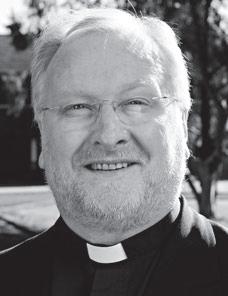 Researcher John Fleming
Researcher John Fleming
and married with three children, Fr Fleming is one of Australia’s leading bioethicists. When he speaks, people tend to listen – not least of all the Federal Government. He is a member of the Commonwealth’s Gene Technology Ethics Committee set up under the Gene Technology Act 2000, and a member of the Vatican’s Pontifical Academy for Life. He says Australians actually want debate on the issue, because they think one abortion per four pregnancies – the conservative figure Fr Fleming gave to survey participants (although the figure is closer to one in three in Australia) – is far too many. Discussion groups who participated in the survey said it was a “national disgrace” that “one in four Australian children never get to see the light of day”.
Contued from Vista 1
In other cases, it sat uncomfortably with them from a broader social perspective, representing a “failure” by Australians to manage the issue, and a cause for national “shame” or at least “concern”.
Fifty-seven per cent of Australians do not agree with the pro-choice argument that the “foetus is not a person”, his survey found.
Despite increasing pro-life hopes of law changes in the United States because of the influence and vitality of the pro-life lobby, including an openly pro-life president, legislation in Australia is unlikely to change in the foreseeable future.
But clearly Australians want less abortion. Former US president Bill Clinton’s statement that “Abortion should be legal, but rare” seems to be the view of the majority of everyday Australians.
“It’s been very, very wrong that so many abortions have been carried out in Australia and there’s been no real attempt to tell women what the realities are. Where did free choice go, and where did informed consent go?”
Fr Fleming uses the controversial former US president’s comment as an example of the path towards the solution and says it’s about time the two sides – pro-life and pro-choice – started dialogue to find some common ground to reduce the incidence of abortion.
There has been plenty of debate flying around – much of it bordering on vitriolic, especially during the West Australian debate and most recently during the RU-486 debate.
The Australian Bureau of Statistics estimates that there were approximately 95,200 surgical abortions performed in Australia in 1996.
On one level, Fr Fleming’s findings were hardly surprising: 62 per cent were in favour of abortion on demand. But this “in principle” position softens when specific circumstances are considered.
This is where Fr Fleming’s study differs from previous investigations: previous surveys generally asked whether abortion should be legal in specific circumstances, perhaps presuming that this reflected the moral views of survey participants.
Previous studies also tended to focus on what areas of disagreement, rather than those of agreement there may be on abortion.
The results of such penetrating, personal questions provided staggering results, returning percentages of approval that are simply unheard of in social research.
Here lies the recipe for a solution to the abortion crisis, Fr Fleming thinks: finding common ground between sides that have been so bitterly opposed.
In his study there was nearunanimous support for serious consideration of all the alternatives before a mother chooses abortion, for counselling prior to abortion and for information on abortion health risks.
And there is overwhelming support for a continuing and inclusive debate. Only 22 per cent of Australians think they are very well

tion provider. Issues that those surveyed thought should be taken into account when deciding whether to have an abortion are: 71 per cent moral issues, 96 per cent the woman’s health, 53 per cent religious considerations, 78 per cent women’s personal circumstances, 80 per cent the consequences for the unborn child.
According to the study, a majority (53 per cent) of Australians believe it should be compulsory to show stages of foetal development with models, pictures or via ultrasound; 96 per cent want physical health risks disclosed; 93 per cent want mental health risks disclosed; and 94 per cent want the risks of infertility disclosed.
So what can both sides learn from all this? Pro-life advocates are encouraged by Fr Fleming to continue their pro-life stance, avoiding polarisation and appealing to the middle ground.
“The pro-choice side now says pro-life calls for counselling is just a con to talk women out of having abortions, and suddenly abortion becomes a sacrament. But they always said in the past that it was not, that it was an appalling thing, that no-one in their right mind would want to have an abortion, but women feel driven to it,” Fr Fleming said.
“Now we’re saying we’ve got some alternatives and they’re saying ‘we don’t want women to do that’.
The Fleming report:
Key findings
62% - support abortion on demand
45% - have ‘moderate’ attitude to abortion (they somewhat agree/disagree/are neutral to abortion on demand)
63% oppose/not strongly supportive of abortion on demand
64-73% - believe abortion rate of 1 in 4 is too high
87% - believe it would be a good thing if numbers were reduced while protecting existing legal rights to freely choose abortion
70% agree with arguments on legal access to abortion based on women’s rights and that abortion is a ‘necessary evil’
75% - agree with argument that it gives women control over their own lives
94% - think alternatives should be seriously considered before exercising option of abortion
85% do not accept the ‘foetus is not a person’ argument
Less than 1 in 4 think abortion is morally justified
85% support legal abortion in cases of severe foetal disability
60% support legal abortion in cases of mild foetal disability
15% - believe abortion is morally acceptable when foetus is healthy and there is no abnormal risk to mother
58% - of adults who have had children support abortion on demand
It’s been a long, long, walk for this tiny unfunded Perth archdiocesan agency manned entirely by volunteers that is devoted to walking all the way with women facing crisis pregnancies. But it’s also been a labour of love. And if it’s one thing to talk the talk on abortion, Pregnancy Assistance has just celebrated its 10th anniversary of ‘walking the walk’.

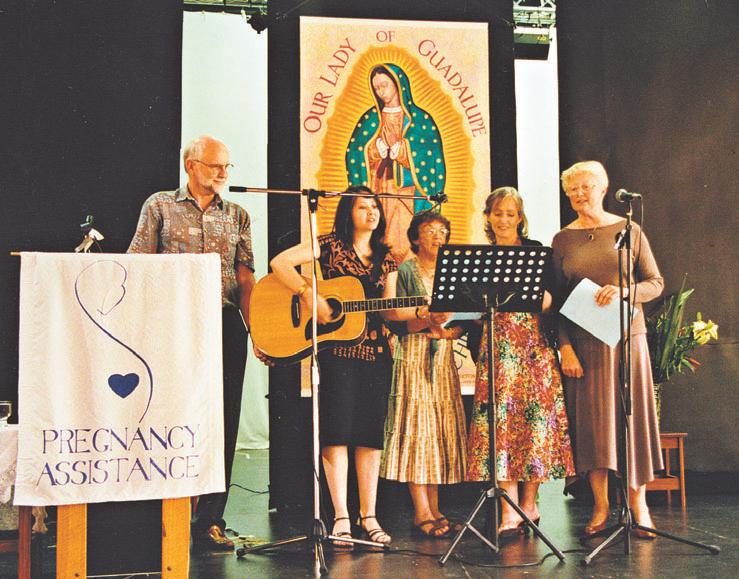
subsequently passed the Unborn Victims of Violence Act, also known as “Laci and Conner’s Law,” which recognises an unborn child as a victim in violent crimes and
Secondly, they say it’s patronising to women on full informed consent – yet every other medical procedure requires the doctor to disclose all risks relevant to that person associated with the procedure.
74% - of adults who have not had children support abortion on demand
61-74% - feel positively towards women who chose alternatives to abortion
28% - positive towards women who choose abortion
informed on abortion, while 71 per cent support greater public discussion and most (76 per cent) believe men have an equal right to public comment.
He is also incensed by the level of public debate from female politicians, describing it simply as “appalling.”
His findings show that these female politicians don’t represent the vast majority of women, let alone Australians, and this was most evident during the RU-486 debate.
“These are middle-aged and older women (Jeannie Ferris is 65), past child-bearing age voting for RU-486,” Fr Fleming said. His study also showed that women of child-bearing age did not support the legalisation of RU486 once they became aware of the risks.
“It’s all very well for old women fighting the battles of the 1970s to be prescribing a course of action for a drug that they will never have to use and therefore never have to be at risk,” Fr Fleming says, “but they are quite out of touch with where young women actually are.”
He also condemned the virulently anti-Catholic nature of debate among politicians, which he said is to be “greatly reprobated”.
Using the Catholic label to undermine pro-life politicians has occurred not only in parliament but also in the press, where Tony Abbott, for instance, is often described as the Catholic Minister for Health instead of Minister for Health.
“(There is) the suggestion that opposition to abortion comes about because of a private religious view, as if it were somehow dropped out of the clouds that ‘abortion is wrong’,” he said.
“But the Catholic opposition to abortion is based on science – i.e. the beginning of a human life, which is a scientific question, not a theological question; and the application of common morality – that it’s always wrong to kill an innocent human being.”
The denial of the scientific basis of Catholic belief, and the prochoice line that men aren’t entitled to a voice, has caused debate to become more vexed.
And when one studies the existing literature on why women seek abortions, often it’s precisely because the father of the baby has disappeared. Or the mother’s parents try to coerce her into having an abortion. This can even happen indirectly, with a family member saying they won’t support the mother if she perseveres with the pregnancy.
This is why, in Fr Fleming’s study, a staggering 99 per cent of those surveyed believed that women contemplating an abortion should have access to counselling, while 94 per cent think that all the alternatives should be seriously considered before having the abortion.
Even among survey participants who were strongly pro-abortion, 72 per cent said counselling should be provided, and 86 per cent think that advice is best delivered by someone independent of the abor-
“It’s been very, very wrong that so many abortions have been carried out in Australia and there’s been no real attempt to tell women what the realities are. Where did free choice go, and where did informed consent go?
“It’s unfortunate that those who belong to the old war in the prochoice side simply have a knee-jerk reaction to all these good social policy initiatives which are directed towards enabling women to have a better chance of choice.
“On the pro-life side, there are those who think you can’t counsel for abortion without actually telling people what to do – and that is completely to misunderstand the role of the counsellor.
“There is also, on the pro-life side, a sense of suspicion about anything at all which is new based on the fact that Australia has liberal abortion laws and is not likely to change them. What do we do? You can say the only thing we want to do is to pass a law that outlaws abortions, but it won’t happen, you’ll waste a lot of people’s time and irritate a lot of people by arguing that end-game approach.”
So in this different climate, what do pro-lifers do?
“Pro-lifers have to stick to their view that it is always wrong, recognise there are serious circumstances that force women into that alternative, and recognise that apart from having law reform which isn’t going to happen, there are other things we can do to assist people to have the babies.”
After all – Fr Fleming’s evidence points to the view that Australians have decided that abortion should be “legal, but rare.”
Significant considerations for when considering abortion or not:
96% - the woman’s health
80%- consequences for the unborn child
78% - the woman’s personal circumstances
71% - moral considerations
53% - religious considerations
99% - believe women contemplating abortion should have access to counselling. Of these:
78% - believe women should have counselling
21% - believe access to counselling should be voluntary
Among those who are strongly proabortion:
72% say counselling should be provided
27% - say it should be voluntary
98% - think women should be advised of any health risks involved in abortion before choosing
Most of the community believe women contemplating abortion should seek advice from more than one source, like a health professional independent of the abortion provider, a relative or friend.
58% indicate that they themselves would not know where to refer a woman for alternative support services during of after pregnancy
22% - think they are very well informed on topic of abortion
71% - support greater public discussion of abortion
76% - believe men have an equal right to public comment
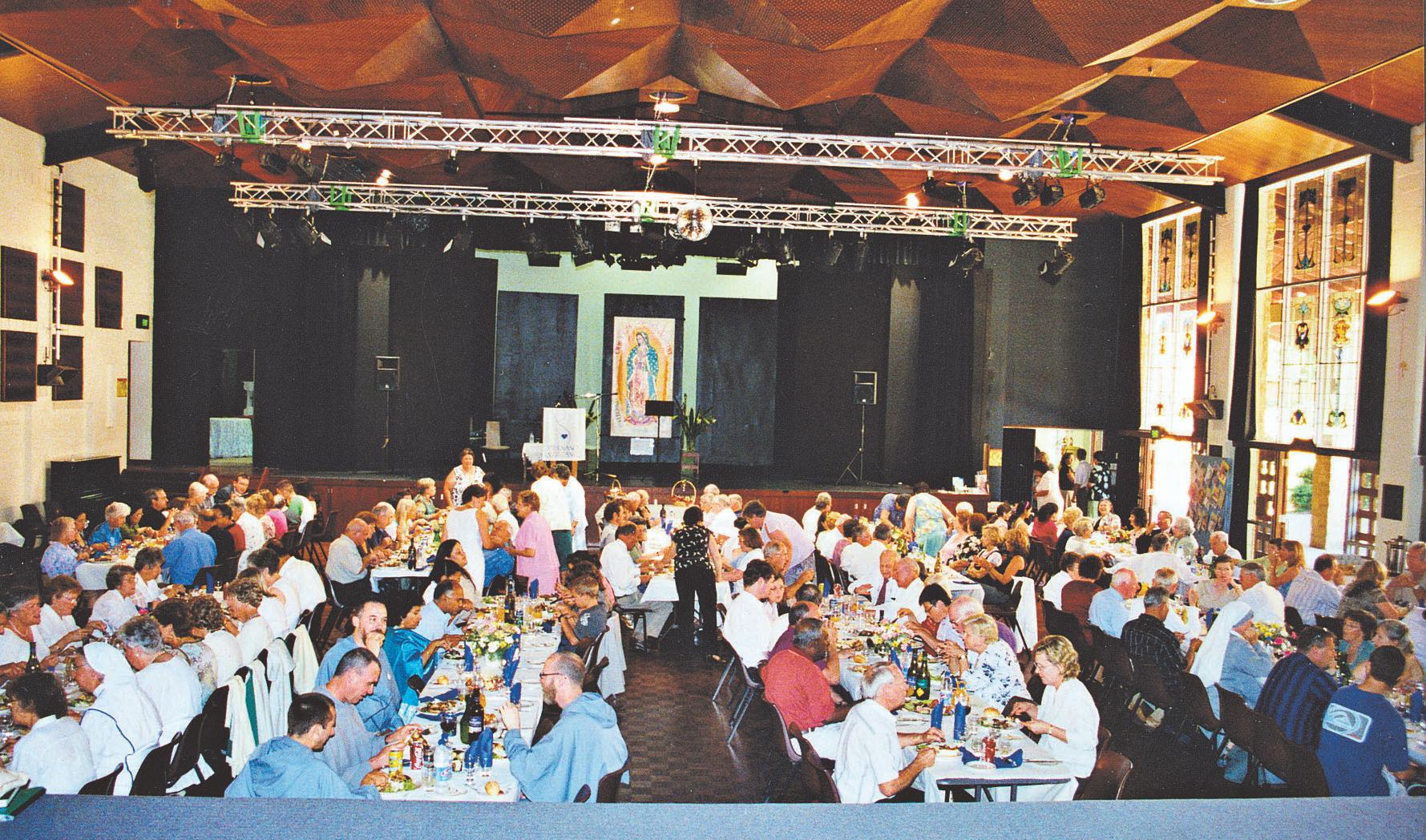 ■ By Anthony Barich
■ By Anthony Barich
When Archbishop Barry Hickey turned up a couple of minutes late for the 10th anniversary Mass of Pregnancy Assistance at John XXIII College chapel last month, he struggled to find a parking spot.
“There must be a football match on or something,” he thought – there couldn’t possibly be this many people here for the event he was attending.
But when he walked into the church for the Mass with 11 concelebrating priests he was overwhelmed by the sight of over 200 well-wishers, most of whom had helped or volunteered for Pregnancy Assistance since it formed upon his own request 10 years ago.
For years, advocates of both sides of the abortion debate – pro-life and pro-choice – talked the talk, but, as bioethicist John Fleming said at Pregnancy Assistance’s 10th anniversary luncheon, it is organisations such as this that are walking the walk. By helping the mother rather than opposing those with different ideologies they are reshaping the abortion debate itself.
And they’re doing it with this ethos: “If we save just one life through all this, it will have been worth it.”
In reality, though, its volunteers have saved hundreds. They are examples of what both sides should be doing – looking after the best interests of the pregnant woman and her child.
It still baffles the Archbishop that an idea he had in December 1995 to have a pregnancy counselling organisation free from Church bureaucracy has been so successful.
Hundreds of Australians owe their lives to the organisation. The turnout at John XXIII College showed the strength of Pregnancy Assistance.
By 1998 the West Australian parliament had passed legislation that legalised abortion on demand, prompting Archbishop Hickey to boldly declare that he would ensure no woman would be forced into having an abortion for reasons of poverty.
It was a big statement.
But the Archbishop matched the words by giving Pregnancy Assistance a house on Lord Street in East Perth in which to base its operations.
The rest was up to a small group of people who followed the Archbishop’s lead.
“He said ‘I’ll give you a house - other than that, you’re on your own’,” recalls Brian Peachey, who at the time was chairman of the Coalition for the Defence of Human Life and has since become chairman of Pregnancy Assistance.
“But I wasn’t daunted by it - I always thought it was essential.”
In the 10 years of its existence, extraordinary people power has been mobilised to make the whole operation possible.
Mass is celebrated three times a week at the Lord Street office – which volunteers freely affirm has been the spiritual centre of the organisation’s work.
“One of the most memorable moments for me was the regular Mass in the chapel,” said Anne-Marie Langdon, who took a year’s leave from work to give of her time voluntarily to help establish Pregnancy Assistance.
“It became a refuge on very busy days, a time to step aside and remember that we were trying to love as God loves in even the most
difficult situation.” Thanks to a very generous donation from an individual, in 1998 the agency put a $10,000 deposit on a $200,000 house in Dianella for homeless pregnant women to stay, and by 2001 it had been paid off by fundraising – more people power.
They called it Miriam’s House. A community of women originally from Wollongong help to run it.
They are now a canonically established community and in the first steps of becoming a religious order called the Sisters of The Apostolate in the Heart of the Holy Family.
They don’t like publicity, but they were acknowledged by the Archbishop when he said: “I give thanks to God who in his providence has sent us the Sisters who have taken up the work at Miriam’s House with such compassion and enthusiasm.”
Nor is Miriam’s House an attempt to proselytise for the Catholic faith.
“It’s to get care to people who want and need it – and most of them are not Catholics,”
Mr Peachey said, although one woman has been so astonished by the help given at Miriam House that she is considering becoming a Catholic, having said the Rosary voluntarily with the Sisters.
Yet the Lord Street office has only ever had one full-time employee.
The present office manager Lydia Fernandez succeeded Anne-Marie Langdon, who held the position for the first eight years.
There’s also a part-time clerical assistant.
Lord Street is manned by two different volunteers five days a week.
On top of that, there are so many other volunteers engaged in tasks such as collecting baby clothes and manning the store which houses a collection of donated cots,
highchairs and other such items that are also repaired.
The Lord Street office receives phone calls, visits from people who knock on the door for help, and conducts pregnancy tests.
It also produces Abundant Life the quarterly publication with a circulatoin of 5000 distributed to parishes around the archdiocese.
Doctors and the Department of Community Development refer patients to it and it has ongoing contact with women, especially those who are abandoned by their families because of their decision to keep their baby.
But while Pregnancy Assistance labours away putting words into action, the war rages on, and they are caught in the crossfire. Twice it was burgled.
At 2am on Easter Saturday last year, Mr Peachey received a call from the police saying the Lord Street office was on fire. By 2.15am he was there, the roof had been ripped off by firefighters in order to get at the blaze and the storeroom was destroyed. Vandals had splattered flammable material in it and set it ablaze.
The storeroom and the rest of the building were rebuilt and donations flooded in. Archbishop Hickey, who had witnessed the destruction later in the morning said he was “pleased” to bless the restoration.
In 2004 someone stole a Holden Commodore, drove it right up underneath the verandah, took the wheels off and set fire to it.
“It went up like a rocket,” Mr Peachey recalled. But it was fixed up – again – and they soldiered on, again because of people power.”
‘People Power’ is appropriate. People, after all, is what it’s all about.
A young Perth Christian woman has started an online service for those seeking a spouse who shares the same faith and values
When Julie Pearce couldn’t find an introduction agency where she could meet fellow, committed Christians, she started her own. She added several business courses to her years of experience in human resources management, borrowed against the equity in her home and launched her agency, “FigTrees” in June this year.
Having lost many years in the social scene through debilitating illness, Julie had explored the option of meeting a partner through secular dating agencies, but found it impossible to meet practising Christians. She initially accepted dates with nonChristian men but soon realised that her beliefs could not be excluded from a relationship and she specified to the agency that she would only like to date Christian men. “My dates went from three or so possibilities a week to zilch!” she says, “Not a single date from then on.” When she shared her dilemma with other Christian singles, she found that it was not an uncommon problem.
Julie suggests that in days gone by Christians met partners through church and associated dances and social events, but now that people’s time was spread over a broader range of interests and activities, these opportunities were no longer available. In her experience since becoming a Christian four years ago, she has observed that while smaller churches seemed to have a family and community spirit, there were often not many singles and that the larger churches, which contained many singles, had no regular or organised means of meeting one another. “God started prompting me to step out in faith and do something”, she says. Shortly after, FigTrees was conceived.
“I worked on FigTrees most evenings after work for 4-5 months before resigning from my job and pursuing it full time”, she explains. When considering her motives, she suggests, “I have a business degree, good administration skills and have been single for most of my life, so I guess I was the ideal candidate.” However Julie is adamant that God inspired both the idea and the courage to start this business. “I used to meditate on 2 Timothy 1:7 which says, ‘God did not give us a spirit of timidity but a spirit of power, of love and of self-discipline.’ Focusing on the Word of God during those times helped keep the fear at bay”, she shares. Julie emphasises that the name, FigTrees, was biblically inspired. “Jesus talks about fig trees bearing fruit”, she says. “I like to think of FigTrees as a business which bears fruit by bringing Christian singles together.”
She also believes that stereotypes portrayed in movies such as “Bridget Jones’ Diary” create false perceptions of single people as lonely and desperate, but the reality, she states, especially for committed Christians, can often be the opposite. “In addition to full time work, sport and exercise and the usual chores, there is Bible study, prayer meetings, volunteer activities and church attendance”, she says, “By the end of the working week, many singles find they don’t have the time or energy to spend finding a partner.”
She has also been confronted by the perceptions of those who

In Berlin he is known as the Terminator and he is the person spouses and lovers do not want to find knocking on their door.
His real name is Bernd Dressler and his services are being increasingly utilised by unsatisfied partners who are not brave enough to inform their wives/husbands/boyfriends/girlfriends that they want to end their relationship.
For a fee of 20 euros ($34) Mr Dressler, 52, will break the bad news to the unrequited lover or for 50 euros upwards he will make a personalised visit.
“I am just the messenger”, says
believe that utilising dating agencies reflects a lack of trust in God. “Some Christians have this warm, fuzzy idea that prayer without any associated effort will result in a partner”. She acknowledges that this may be the case for some, but she believes that most singles will not meet a partner without a prolonged, conscious effort. She suggests to those who promote this faith without action philosophy that they would not apply the same principle to someone seeking a job. These people would be advised to actively get out there and look for work, she says.
Julie is also fond of referring to Genesis chapter 24 to give spiritual foundation to her venture. Abraham wanted to find a wife for his son Isaac, so he sent a trusted third party, his servant, to find one. “Abraham didn’t just pray and trust God, hoping that a wife would just turn up”, says Julie. “Instead he acted and
the former insurance man. “People go to dating agencies to find a lover. By helping unhappy couples to split up, I am offering the same kind of service, but in reverse.”
He offers four different termination packages, ranging from a, “let’s stay friends” arrangement to providing a detailed explanation of why his client has decided to split.
There is also a follow up service, which includes collecting a client’s belongings from the home of a former lover. Mr Dressler always begins his discourse in the same way, “Good day, my name is Bernd Dressler from the Separation
invested time and money in his quest to find Isaac the right wife.” She believes that there is no reason why Christians who are serious about finding a partner should not follow this example.
Figtrees caters for committed Christians of all denominations. The current age of members ranges from early 20’s to 70, although older people are encouraged to join. They are scattered across Perth, with some as far south as Mandurah. There are also regular enquiries from singles living in nearby country towns.
Julie interviews all singles in the comfort and privacy of her Victoria Park suite, before they become members. In this way she is able to cater for individual wants, desires and needs. She also uses the time to help people discern the most suitable environment for them to meet other singles, either through one-on-one dates or group dinners for six to
Agency and I have been asked by your partner to inform you that he or she wishes to end the relationship”. He states that he never gets involved if somebody starts crying or gets emotional. He simply tells them that he has come to pass on a message.
Since beginning business last July Mr Dressler has had more than 200 inquiries and has assisted in terminating 120 of them. He believes that his service is a sign of the times.
“I have come to the conclusion that younger people can’t face up to ending difficult affairs themselves,” he said.
eight people of a similar age. Julie is also anticipating an Annual Ball for Christians becoming a regular feature of Figtrees calendar.
At 38 and still single herself, Julie is well aware of the difficulties facing those genuinely searching for a lifelong partner. Having come to a true relationship with God through her healing from chronic illness, she has enthusiastically embraced FigTrees as God’s will for her life. She has already seen many lives change since the inception of her business and believes that these have made her sacrifices and hard work worthwhile. She will be attending her first Figtree-inspired wedding in December this year.
For a woman who can produce dates from FigTrees, the future promises to be very fruitful!
For more information on FigTrees see www.figtrees.com.au or contact Julie Pearce on (08) 9472

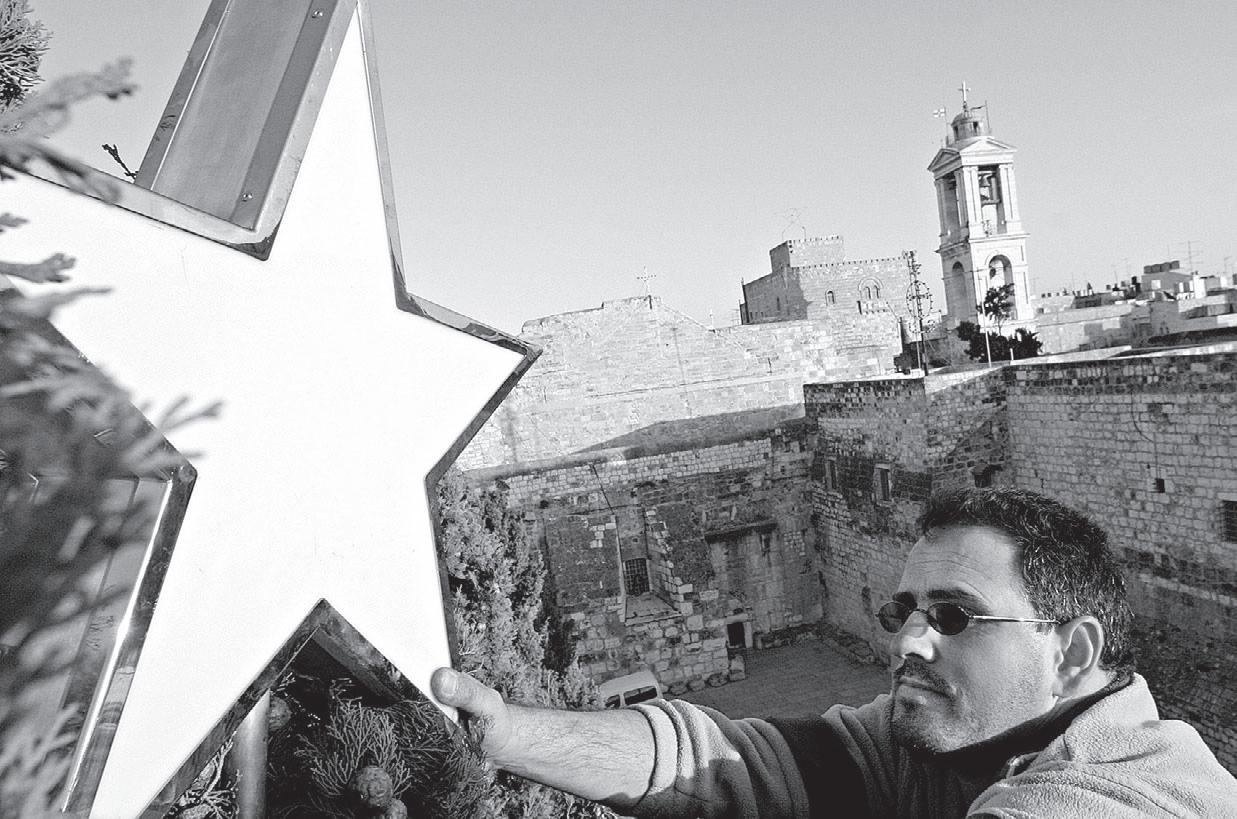 ■ By Anna Krohn
■ By Anna Krohn
Today it is difficult to resist being sucked into the vortex of the “secular” take on the season of Advent.
Advent has, for many of us Australians, been turned into a race against the grim “reaper” of vacation deadlines, footslogging and heartbreaking shopping sprees and a liver-busting circuit of “break-up drinks”.
By the time the 25th of December comes around, we can be as irritable, unsociable and jaundiced
as a whingeing child who needs bed rather than the “merry gentlemen” of the traditional and more Christian carols.
The “everlasting freshness” of Gilbert Keith Chesterton’s vivid reflections on the season of Advent and Christmas are a timely tonic for this ennui of excess.
(This year marks the 70th Anniversary of the great English essayist, novelist, broadcaster and convert’s death.)
Not that Chesterton, a man of immense physical, intellectual and imaginative presence and appetite
had anything against rollicking excess. Indeed he says: “Joy is the gigantic secret of the Christian”. But although he tended to depict himself as an absent-minded and childlike buffoon there was nothing glib, naïve or superficial about his understanding of joy. His grasp of theological reality was so firm, that he realised that we can only discover the real and earth-shattering joy of the Nativity, “We follow the feet where all souls meet, at the inn at the end of the world” ...if we realise that God’s gift to us
of the Christ-Child is meant to turn our mean-spirited, ungrateful and bored self-sufficiency decisively “up-side down” and “inside-out”.
Chesterton experienced within his own time and within his own heart enough of the gravitational pull of sin and evil to know that the drama of the Incarnation of the Baby Jesus was anything but a comforting child’s story.
He knew that Christianity and the real Christmas event will never be a tired and burnt-out old custom but “always a nuisance and a new and dangerous thing.”
Advent is both a time of joy, and a time of putting to death our old idols of self-deception and banality. It is a time to be fearfully and wondrously watchful and open to conversion - which Chesterton called the constant and on-going “Mark of the Faith”.
Advent is not a bus tour through the shops, or the hang-over of stale inebriation, but a revolutionary and heart-stopping journey away from our blasé old world and our sinful old selves into the “heart of Creation”.
We follow the new “star” - the fiery, purifying and blinding light of God’s love and truth born into the darkness of the cave.
The Christ-child lay on Mary’s heart, His hair was like a fire. (O weary, weary is the world, But here the world’s desire.)
The Christ-child stood at Mary’s knee, His hair was like a crown. And all the flowers looked up at Him, And all the stars looked down.
GK Chesterton ‘A Christmas Carol’
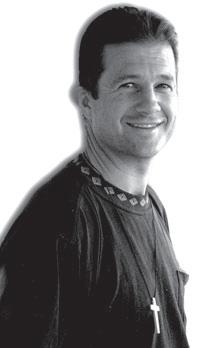
i say, i say
■ By Mark ReidyThere is a young man I know whom the world considers insane. He lives alone in a caravan and has the windows plastered with newspaper so that no one can see in and he can’t see out.
He has a sign next to his television that tells him that the messages coming through are not directly for him.
Most of the time, though, he doesn’t believe that sign. He lives in constant terror that people are spying on him or are out to do him harm.
He has another sign that tells him that this isn’t true, but he rarely believes that sign either. He seldom washes and he wears thick layers of winter clothes during the hottest months.
He attempts to control the many voices and visual illusions by trying to persuade himself that they aren’t real. It’s a never-ending battle. Occasionally he will have good days, but mostly he is imprisoned in a world of fear.
Now there’s another man I know whom the world would consider a saint. He is so attuned to the pain and suffering of others that he chooses to live on steamed rice and
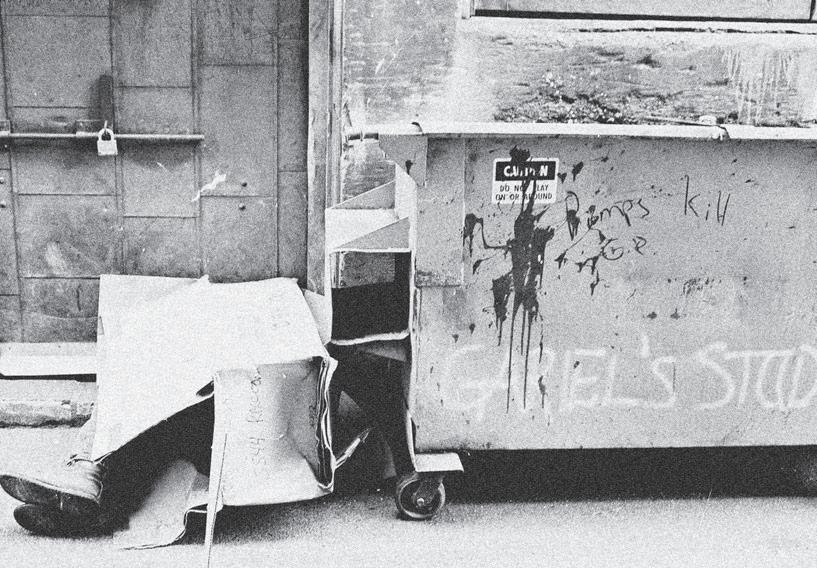
vegetables as an act of unity with the millions who are starving in the world. He cannot understand how such poverty can co-exist with the wastefulness and excess that he sees in Australia. He refuses to be a part of it. He never throws out any food, never buys himself anything new and for many years has sponsored children from Third world countries. He is a man many would be proud to know.
But do you want to know the
most remarkable thing about these two men, the saintly and the insane?
…They are the same person!
“Simon” is a beautiful man, but sadly few will ever come to know his amazing heart of love. Why? Because it is buried beneath an exterior which repels most people. At best he will receive a nervous second glance before feet scurry and heads turn to ensure that no eye contact is made.
Simon is one of a growing number of psychiatrically ill who
are finding themselves abandoned within Australian society.
“Liberated” from the shackles of government institutions, many of these people are now scattered throughout the boarding houses and squats of our cities, lost within a system that is under-funded and understaffed.
“Expect to see a lot more”, a Mental Health worker told me recently. It is difficult to find them places he says, because they display anti-social behaviours.
People are afraid to be in the same vicinity as them, let alone live near them.
Inevitably they find themselves in a social, emotional and physical vacuum, islands in a sea of humanity.
There’s another person I know called Kathy. She spends her day sitting on a bench surrounded by bags, mumbling to herself. She has no home.
She has several cages with her, in which she carries sick and lame pigeons. “I try to help those ones that can’t look after themselves”, she says softly. “I just love them and hold them, until they can fly away to somewhere better.”
My heart is humbled whenever I see this lonely lady. She has something to teach us all.


ISTANBUL, Turkey (CNS) -
During his four-day trip to Turkey, Pope Benedict XVI, known for his precise and incisive words, showed he was also a master of the spontaneous gesture.
While his scholarly words in a September lecture in Germany were used by many media and Islamic leaders to whip up fury among millions of Muslims, his prayer in an Istanbul mosque surprised and delighted many of them.
For papal watchers the contrast between the tones of his reference to Muslims and violence in Germany and his silent prayer in the Blue Mosque was not the only surprise. Pope Benedict was supposed to be the pope of strong words in contrast to Pope John Paul II, the pope of strong gestures.
The silent prayer facing Mecca, the site of Islam’s holiest shrine, also seemed to be in contrast to the predictions of pundits who assured the world that Pope Benedict would be more challenging than conciliatory with the world’s Muslim believers.
Retired French Cardinal Roger Etchegaray, a close aide to Pope John Paul and a member of Pope Benedict’s entourage in Turkey, told reporters on December 1: “I would compare the visit of the Pope to the mosque to the gesture of John Paul II at the Western Wall,” the Jewish holy site in Jerusalem where Pope John Paul in 2000 deposited a prayer asking God’s forgiveness for the ways Christians had mistreated the Jews. Pope Benedict’s prayer at the mosque and Pope John Paul’s prayer in Jerusalem “are two very important symbolic moments,” Cardinal Etchegaray said. “In both cases, we did not expect it.”
Judging simply by what Pope Benedict had said were his objectives in visiting Turkey, the trip was a success.
Setting off from Rome at the beginning of the November 28-

December 1 visit, the Pope said the point of the trip was the contacts he would make and the friendship and respect they would demonstrate.
While the Pope received a warm welcome from the moment he got off the plane in Ankara, Turkey’s capital, any remaining hesitation on the part of the Turkish people melted when the Pope prayed in the Istanbul mosque on his last night in the country.
From the beginning, the trip was planned as an occasion for the Pope to pay his respects to Orthodox Ecumenical Patriarch Bartholomew of Constantinople. After a prayer service, two liturgies, private meet-
ings and a lunch, the brotherhood the Pope and patriarch publicly professed also appeared publicly demonstrated.
But given the tensions present before the trip with both the Turkish government and the country’s Muslim majority, Pope Benedict’s positive encounters with Muslims stole the headlines. Even the Turkish papers, initially lukewarm to the idea of a papal visit, were impressed.
The daily Hurriyet reported on December 1: “The Pope, who earned sympathy with words in the spirit of an apology to Muslims, continued to surprise the world.”
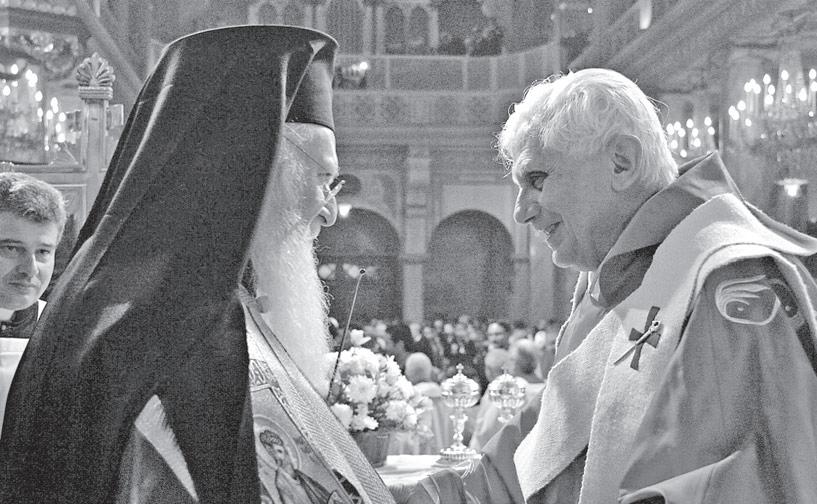
The paper, like much of the world, particularly was struck by his prayer alongside a Muslim cleric in the mosque. Hurriyet reported the Pope “turned toward Mecca and prayed like a Muslim.”
The December 1 English-language Turkish Daily News headline read: “The Pope is winning hearts and minds.”
And the article described the Pope’s visit as “a moment of reconciliation” with the country’s majority Muslim population.
As he was setting off from Rome on November 28, the Pope had told reporters travelling with him that they should not have exaggerated expectations of such a short trip.
“The value (of the trip) I would say is symbolic, the fruit of the encounters themselves, of encounters in friendship and respect.”
When the trip was over on December 1, one would only have to look at photographs of the Pope with government officials, Muslim representatives and leaders of the Orthodox churches to see that a connection was made.
After a 30-minute free-flowing discussion on November 28 with Ali Bardakoglu, the country’s top Muslim official, the two appeared before reporters grasping both of each other’s hands. And after attending Patriarch Bartholomew’s cele-
bration of the Divine Liturgy at the Orthodox cathedral, the two blessed a small crowd together before the patriarch took the Pope’s hand and held it aloft as they waved.
Even some of the obligatory gifts given during the trip seemed to conspire to carry a positive message, particularly when they were coincidentally similar, as they were at the Blue Mosque.
Jesuit Father Federico Lombardi, Vatican spokesman, pointed out that doves - the symbol of peace - were the main feature on the blue tile Istanbul’s grand mufti gave to the Pope and on the mosaic Pope Benedict gave to the mufti.
And, before leaving Istanbul on December 1, the Pope released four white doves from the courtyard of the Catholic Cathedral of the Holy Spirit.
Father Lombardi told reporters late on November 30, “It seems we’ve gone well beyond expectations.”
Not only were there no confrontations with Muslims over what the Pope said in Germany in September, but the Germany speech seemed to give way to a new look at “the theme of relations between Christians and Muslims with serenity and depth, seeking to make important clarifications on both sides,” Father Lombardi said.
VATICAN CITY (CNS) - Pope Benedict XVI was deeply saddened by the November 30 ordination of a Chinese bishop without Vatican approval, an act that can further fracture the Catholic community in mainland China, said a statement from the Vatican.
In a December 2 statement, the Vatican said officials found out at “the last minute” about plans to ordain Father Wang Renlei, 36, as coadjutor bishop of Xuzhou, China, at the diocese’s Sacred Heart of Jesus Cathedral.
Still, Vatican officials did what they could “so that this act, which would have produced a new laceration in the ecclesial community, would not come about,” the statement said.
“In fact, an illegitimate episcopal ordination is an act that is so objectively serious that canon law establishes severe sanctions for those who confer it and those who receive it,” the statement said.
The new bishop and the bishops
who ordained him face automatic excommunication if they acted of their own free will, the Vatican said. “The Holy See is aware of the spiritual drama and suffering of those churchmen - consecrating bishops and ordinands - who find themselves forced to be an active part of illegitimate episcopal ordinations, thus going against the Catholic tradition that in their hearts they desire to follow faithfully,” the statement said.
Father John Dai Zhenbao, a parish priest at the cathedral, told the Asian church news agency UCA News that Bishop Joseph Zhao Fengchang of Yanggu was the ordaining prelate.
Bishops Francis Lu Xinping of Nanjing and Peter Joseph Xu Honggen of Suzhou were the other ordaining prelates, Father Dai said.
Also present at the episcopal ordination were Bishop Thomas Qian Yurong, 94, of Xuzhou and Bishop Peter Feng Xinmao of Hengshui. Except for Bishops Lu and Qian,
all the other bishops involved have been approved by the Vatican.
According to a laywoman who attended the ordination, Bishop Qian, clad in his chasuble, joined the liturgy but did not preside. She described the ordination Mass as solemn and smooth and said she did not hear Catholics discussing the illegitimacy of the bishop’s ordination.
The third illicit episcopal ordination this year came several months after Bishops Joseph Ma Yinglin of Kunming and Joseph Liu Xinhong of Anhui were ordained on April 30 and May 3, respectively, despite opposition from the Vatican.
The Rome-based missionary news agency AsiaNews reported that Bishop Xu and Bishop Li Liangui of Xianxian were kidnapped by members of the Religious Affairs Bureau to force them to participate in the ordination. It said the prelates were taken away by car on the pretext of looking at property owned by the church in Tianjin, but instead
found themselves under guard in Xuzhou.
AsiaNews reported that Bishop Li was able to escape.
Maryknoll Sister Janet Carroll of the US Catholic China Bureau, who knows Bishop Xu, told CNS she believed he either was forced to participate or was tricked into participating. She said he was one of 12 priests called to be ordained bishops illicitly in January 2000 and “he absolutely refused” - only five were ordained.
Even later, after Bishop Xu was approved as a bishop by the Vatican, he refused ordination until he was allowed to be ordained by valid bishops in communion with Rome, she said.
“I would suspect that he was told that permission had come from Rome. That’s what happened with (Bishop) Ma,” Sister Janet said on November 30.
She said a bishop could go through the motions of an illicit ordination, but there is no way of
knowing “what’s in his heart and in his mind.” If, in his heart, the bishop is refusing to ordain someone illicitly, then the ordination is not valid, she said.
“All of this just shows what a circus it is,” she said. “It’s also sad because it involved people who are known to be loyal and faithful leaders of the Church” who were forced to participate.
In 1957, the Chinese Catholic Patriotic Association was formed by the Chinese Communist Party in an attempt to force Chinese Catholics away from communion with the global Church.
Bishops ordained by members of the CCPA did not have Vatican approval, but in the mid-1980s began secretly seeking such approval. Church sources say as many as 90 per cent of the bishops in the government-approved church are recognised as legitimate bishops by the Vatican. This is reportedly tolerated by the Chinese government as long as bishops are not too open in


● Counselors treat it through Catholic social service agencies.
- The “evil of pornography” has spread like a plague throughout the culture thanks to mainstream entertainment and threatens the fabric of society far beyond the boundaries of church and school, said a US Catholic bishop in a new pastoral letter.
● Catholic school teachers, youth ministers and religious educators confront its effects in the lives of young people.
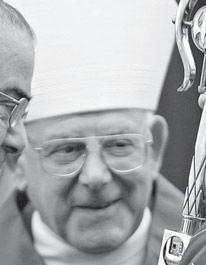
“This plague stalks the souls of men, women and children, ravages the bonds of marriage and victimizes the most innocent among us,” said Bishop Paul Loverde of Arlington.
“It obscures and destroys people’s ability to see one another as unique and beautiful expressions of God’s creation, instead darkening their vision, causing them to view others as objects to be used and manipulated.
“Today, perhaps more so than at any time previously, man finds his gift of sight and therefore his vision of God distorted by the evil of pornography,” Bishop Loverde said.
“As part of my responsibility to lead all the people in the Diocese of Arlington to the vision of God, I find it necessary now to address the tremendous moral, social and spiritual dangers of pornography.”
Bishop Loverde’s newest pastoral letter is titled Bought With a Price: Pornography and the Attack on the Living Temple of God. The full text can be found online at www.arlingtondiocese.org.
The bishop, who belongs to an interfaith coalition called the Religious Alliance Against Pornography, said he became more aware of the growing plague of pornography from various sources:
● His brother priests routinely confront it in the confessional.
● Parents speak of the challenges of raising children to act and dress with modesty in today’s culture.
In his letter, Bishop Loverde examines the nature of the current threat and addresses the arguments
put forth by those who defend the pornography industry. He offers concrete counsel to all Christians, young people, couples and priests on how to guard against pornography and reflects “on the gift of sight and its fulfillment in divine contemplation.”
“Our sight, more than just a physical ability, also serves as an important means for understanding faith, heaven and salvation. Indeed,
its proper end and fulfillment is the vision of God himself. Man’s final purpose is caught up with his ability to see,” he said.
The bishop said that “no one person living in our culture can totally separate himself or herself from the scourge of pornography. All are affected to a greater or lesser extent, even those who do not directly participate in the use of pornography.
“In a culture that sees pornogra-
phy as a mere private weakness or even as a legitimate pleasure to be protected by law, we must repeat here the Catholic Church’s constant teaching,” Bishop Loverde said.
“In simple terms, the Catechism of the Catholic Church condemns pornography as a grave offence.
“The immorality of pornography comes, first of all, from the fact that it distorts the truth about human sexuality,” he said.
LA archdiocese settles 45 abuse cases for $60 million - but says another 500 more to come of deception, kidnapped bishops in diplomatic China ploy
their allegiance to Rome. Last year, several new Chinese bishops chosen by the Vatican received government approval.
In many of those ordinations, a papal bull expressing approval was read at the ordination. One source familiar with the Catholic Church in China told CNS that China desperately wants to normalise relations with the Vatican.
When Chinese officials felt the Vatican was not paying enough attention to them, they gave the goahead for the ordinations of the first two illicit bishops, the source said.
In June, less than two months later, two high-level Vatican officials visited China. After the November 30 ordination, Anthony Liu Bainian, vice chairman of the CCPA, who attended the ceremony, told UCA News that Chinese church officials did not contact the Vatican about it, since there is no proper channel for doing so.
However, he said church officials asked the Chinese government to
LOS ANGELES (CNS) - The US$60 million settlement of 45 cases in which clergy had been accused of sexual abuse is “fair and just,” Cardinal Roger M. Mahony of Los Angeles said on December 1.
In a statement, the cardinal also termed the settlement “a positive step forward in the Church’s efforts to promote healing and reconciliation for those who have suffered abuse by members of the clergy.”
He also made a personal apology to all victims of abuse by a priest, religious or deacon in the archdiocese.
“The sexual abuse of minors is both a sin and a crime, and there is no place in the priesthood for those who have abused children,” he added.
The archdiocese said its share of the settlement was about $40 million, with the remainder covered by insurance companies or religious orders. The amount of the settlement “was anticipated and set aside last year,” it added.
“I want to assure you ... that no parishes will be affected as a result of this settlement,” Cardinal Mahony said. But the cardinal
said settlement of the remaining sex abuse claims the archdiocese faces - estimated at more than 500 - “will not be without pain and may require the archdiocese to reevaluate some ministries, services and nonessential properties.”
“The Archdiocesan Finance Council, the Council of Priests and the deans will continue to work closely together to determine the best way to meet the archdiocese’s share of future settlements,” he said.
Settlements in those cases “will require the active participation of the many insurance companies who provided liability insurance during those past years when abuse occurred,” Cardinal Mahony said.
“It is my hope that these insurance companies will join all of us in moving steadily toward a final settlement of these cases as soon as possible.” More than 1,000 allegations of clergy sexual abuse have been made in California, in part because of a 2003 law that extended the statute of limitations for such claims.
In 2004, the Diocese of Orange, created in 1962 from territory of the Los Angeles Archdiocese,
agreed to pay $100 million to settle 90 abuse claims.
In a 2004 report, the Los Angeles Archdiocese said it had settled child molestation cases since 1985 for a total of $10.35 million.
Of that, it said, the archdiocese paid about $3.75 million, insurance paid about $3.7 million and the remainder was paid by others, such as religious orders, other dioceses or the perpetrators themselves.
In all, it said, “656 persons have accused 244 priests, deacons, brothers, seminarians and one bogus priest of child sexual abuse.” It said 5,000 priests served in the archdiocese during that time.
The archdiocese also issued a list at that time of “210 priests, deacons, brothers and seminarians in the archdiocese and one bogus priest ... accused of sexual misconduct involving a minor” since 1930.
It said an additional 33 men who were not listed have been accused. It said there had been no criminal or civil action against 28 of them; in the other five cases, the archdiocese could find no record that the person named in a lawsuit ever existed.

Bishop Loverde reminded the faithful that the use of pornography is gravely evil and those who knowingly engage in such activity commit a mortal sin.
“Such actions deprive them of sanctifying grace, destroy the life of Christ in their souls, and prevent them from receiving holy Communion until they have received absolution through the sacrament of penance,” he said.
“The most tragic and frightening victim of the scourge of pornography is the family,” Bishop Loverde said.
“Although the ‘intimacy’ promised by this vice is illusory and the happiness sought in its practice is transitory and destructive, the damage to the human relationships so necessary for the flourishing of the family is even more shockingly real and, in many cases, permanent.”
The bishop said society stands at a threshold.
“Either we can continue to allow this plague to spread with fewer and fewer checks, or we can take concrete steps to uproot it in our lives, our families, our neighbourhoods and our culture.
“A free people can combat the tremendous moral, social and spiritual dangers of pornography with great courage,” he said. “My fervent prayer is that Catholics, other Christians and all people of good will understand this threat, confront it, facilitate true healing, and ever more fully live out our Godgiven use of human sight.”
■ For full text of statement on the Internet, go to: www.arlingtondiocese.org
pass the message to the Vatican that Father Wang had been elected to the bishop’s post and would be ordained.
Responding to reported concerns that the new bishop had not applied for papal approval and time was not given for the Vatican to undertake an investigation of the candidate, Liu said the new bishop had informed the Vatican about his election and ordination through a third party.
He said Church officials investigated the candidate, who was elected unanimously by priests, nuns and religious of the diocese.
He also denied reports that the Religious Affairs Bureau kidnapped the bishops.
The new bishop, born in Weishan in Shandong province, graduated from the National Seminary in Beijing and was ordained a priest in 1996. He was appointed vicar general of Xuzhou in 2001 and has been working in the bishop’s house since January 2005.

a tale of the rewards of a pure heart
Ages 6-12
This captivating adventure follows a young squire who travels a long, dangerous road beside his brave knight, on a quest for their king. The action builds until the final confrontation with a monstrous, evil dragon. Only then does the
squire learn of the secret beyond the cave that ends in a joyous celebration for the entire kingdom.
Children will gain valuable insight as they learn, along with the young squire, what it means to face the dangers of temptation, and what it takes to guard one’s heart from all that is impure.
RRP $20 + postage


Ages 9-15
The story of the greatly beloved St Anthony of Padua, Franciscan saint, including his voyage to Morocco, his shipwreck, meeting with St Francis, his preaching and the miracles he worked.
RRP $19.95 + postage

Ages 9-15
Although Elizabeth was a princess she longed to live the kind of poverty she heard about through the Franciscans. Her subjects were never able to grow accustomed to the queen who lived the life of a saint
RRP $19.95 + postage
For ages 10 and older
Breakthrough! The Bible for young Catholics was created for young people like you, leaving childhood and entering adolescence. Its ten special features were created to help make the Bible easier to read and understand. You will learn about the great people of the Bible. You will see how God has been breaking through in human history and connecting with humanity for thousands of years. Most important, you will discover, in the Bible, God’s message for your life today! This message is brought to life with: 40 full-colour inserts with interviews and illustrations, so you can get to know the Bible’s people of faith
616 Pray It! Study It! Live It! articles to help you

Ages 9-15
For more than 150 years the Miraculous medal has been known and worn by Catholics throughout the world. Less well known than the Medal is the French Sister to whom the Blessed Virgin gave the Medal in 1830.
RRP $19.95 + postage

Ages 9-15
Over 300 years ago Frenchmen flocked to parts of Canada seeking furs and riches - but some came to give faith to the Indians. This is the story of Jesuit saint and martyr St Isaac Jogues and his life’s work among the Indians.
RRP $19.95 + postage
better understand the Bible and God’s message for your life
99 ‘Catholic Connection’ articles, connecting the Bible’s stories with Catholic beliefs, introductions to, and facts about all the books of the Bible
a timeline explaining how God was breaking through in the major periods of biblical salvation history
6 lists to help you find important Bible stories, prayers, and teachings
a word list with definitions of more than 180 important Bible words
a complete list of the Sunday readings for all three cycles of the Church year
9 colour maps
RRP $34.95 + postage

Br Andrew set out on his journey to bring Christ’s message to the poor, the suffering, the exploited. In these pages he brings Christ’s message to readers by showing us the Spirit of God alive in ordinary people living with tragedy, disability or oppression.
RRP $10 + postage
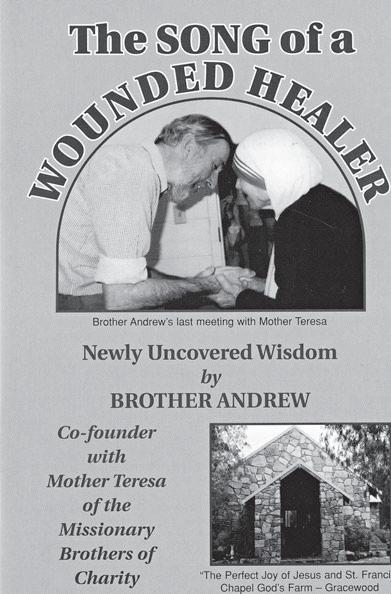
In 1998 Br Andrew, co-founder of the Missionaries of Charity Brothers and priests with Mother Teresa, gave a friend the manuscript of this book. Ill-health sidelined its publication until it was re-discovered a few years ago. A treasure of modern spirituality.
RRP $7 + postage
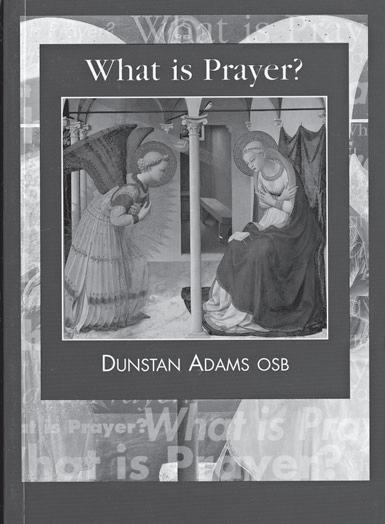
Fr Dunstan Adams OSB is a monk of Ampleforth Abbey and writes a highly accessible approach to the perennial question so important to all of us: what is prayer?
RRP $14.95 + postage

The autobiography of GK Chesterton adult readers
GK Chesterton was one of the most provocative and well-loved English writers of the twentieth century. He preferred not to write this autobiography but did so near the end of his life after much insistence by friends and admirers. According to critic Sydney Dark, “Perhaps the happiest thing that happened in Gilbert Chesterton’s extraordinarily happy life was that his autobiography was finished a few weeks before his death. It is a stimulating, exciting, tremendously interesting book. It is a draught indeed, several draughts one after the other of human and literary champagne.”
Full of Chesterton’s wonderful wit and wisdom, with some 40 rare photographs, this book will be greatly desired by Chesterton fans, as well as by anyone interested in learning more about this brilliant and colourful man.
Gilbert Keith Chesterton was one of the most prolific authors of modern times, having written some 100 books on many topics including philosophy, theology, poetry, literature, fiction and history. His best-selling works include Orthodoxy, The Everlasting Man, What’s Wrong with the World, St Thomas Aquinas, St Francis of Assisi, The Man Who Was Thursday and The Father Brown Stories.
RRP $29.95 + postage

In a time when the family is breaking down and fathers are bewildered by their changing roles, it is necessary to have resources which draw on the wisdom of the past but which remain relevant for busy, modern parents. In this book St Benedict’s famous Rule is split into the daily sections read by those in convents and monasteries. Benedict’s vision of the monastery as a Christian family is supremely applicable to the most basic religious community - the Christian family. And next to each reading Dwight Longnecker has added a short commentary applying Benedict’s timeless wisdom to the spiritual and practical needs of the modern home. Married with four children, Longnecker is also a novice oblate at the community of Mont St Michel in France.
RRP $24.95 + postage

Leading educationalist and parenting specialist James Stenson distils for parents his guide - based on successful families - to neutralising the assault on children’s character from the corrosive society that values little except money.
RRP $7 + postage
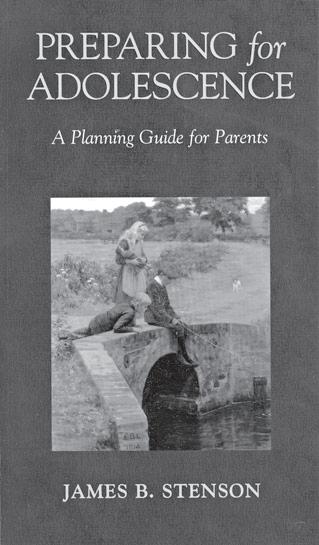
James Stenson has made a lifetime’s work out of studying successful families and passing on their accumulated wisdom. This excellent, short, readable guide helps parents to guide their children through adolescence.
RRP $7 + postage
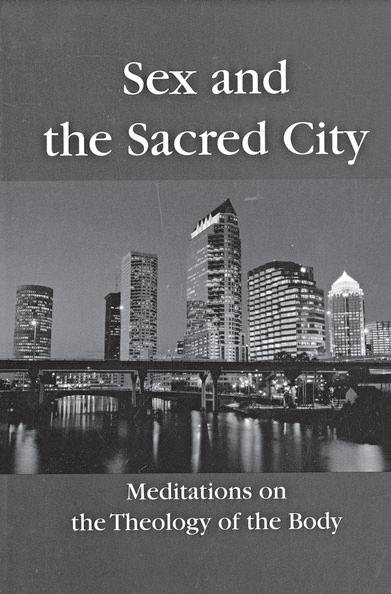
THEOLOGY OF THE BODY
George Weigel has called Pope John Paul II’s Theology of the Body a theological timebomb set to go off in the future with unforeseeable consequences. Steve Kellermeyer’s ‘Sex and the Sacred City’ is one of the first concussions from that event. Short, readable, easy to grasp and excellent for spouses and parents - the best in Catholic tradition and fullness of truth.
RRP $15 + postage

Mothers and Fathers - here’s help to maintain your confidence and peace of mind even during your toughest times as a parent. With a warm understanding of the trials of parentshood James Stenson emphasises your sacred mission: to bring your children face to face with God.
RRP $19.95 + postage

Compass summarises the lessons and experiences of parents to help them succeed as leaders for their children. James Stenson looks at successful families - how they succeeded and why they succeeded are the focus of this book - forming character, countering the consumer culture, dealing with the media.
RRP $19.95 + postage
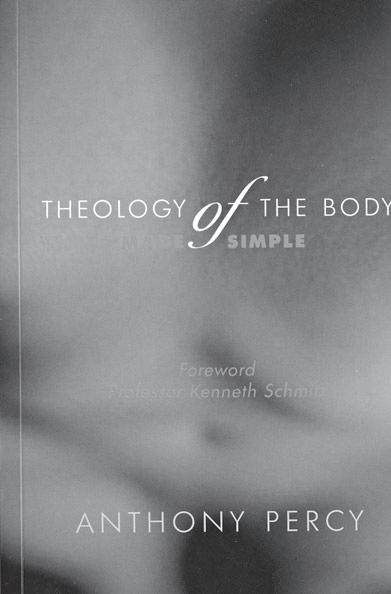
All Australia is talking about this country’s contribution to spreading the Theology of the Body. Fr Anthony Percy’s gifted, exciting summary is a masterpiece.
RRP $16 + postage
Acolyte Nick De Luca’s devotion to Saint Padre Pio instilled a great sense of faith within him and led him to form the first internationally recognized Padre Pio prayer group in Western Australia – he never imagined that it would take him across the globe on a pilgrimage that allowed for him to serve Mass celebrated by Pope Benedict XVI. An acolyte for ten years at Good Shepherd parish in Lockridge, Mr De Luca was keen to initiate a regular prayer group devoted to the contemporary saint, whose life, Mr De Luca said, is most relevant to present day Christians.
After registering the prayer group online three years ago, Mr De Luca was thrilled to receive an invitation in August to participate in the global 50th celebration of what is perhaps considered Padre Pio’s greatest work, the House for Relief of Suffering at San Giovanni Rotondo, in Italy.
Founded by Padre Pio in 1956, the House essentially operates as a hospital where the saint wanted the sick, especially the poor to find relief from their suffering through both modern medicine and prayer.
Today the hospital has become the largest and most modern in Southern Italy. On behalf of his Perth prayer group, Mr De Luca decided to attend the event on October 13 and 14, for which assistant priest at Lockridge, Fr Hong Phan hand-painted a com-
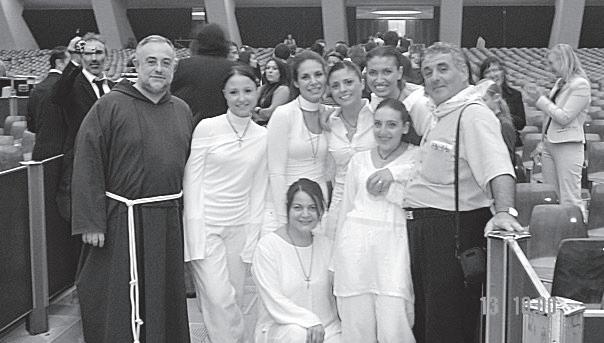
memorative banner. While on pilgrimage to Italy, Mr De Luca attended ‘La Clinica’ a youth recital that used music and drama inpired by the life and works of the modern-day saint, in celebration of the 50th anniversary. Over 100 youth participated in this event, which Mr De Luca says inspired him to advocate the fervent faith he recognized in the youth he met.
On October 14 Mr De Luca was honoured with the opportunity to serve as an acolyte at the anniversary Mass, celebrated by Pope Benedict XVI. “I remember calling out to the Pope – I’ll see you in Australia,” recalls Mr De Luca. The Pope extended his greet-
ing to Capuchin friars; to managers, doctors, nursing staff and personnel of the hospital; to the pilgrims from the diocese of San Giovanni Rotondo; and to members of prayer groups, who came from all over the world in celebration of this event. “Padre Pio’s heart, on fire with charity, gave rise to the House for the Relief of Suffering, whose name already shows the inspiration that characterizes it and the program it intends to accomplish. “Today, prayer groups have spread to parishes, convents and hospitals, and more than 3,000 groups are present on every continent,” he said. Returned from the pilgrimage, Mr De Luca plans to spread
the fire of his faith to members of his Lockridge prayer group, his parish and the state.“I want to tell the world what an honour it is to be part of this prayer group and share the benefits of being a close follower of Saint Padre Pio,” he said. Mr De Luca urges all parishes to initiate a Padre Pio prayer group and to register as part of the international society that keeps in regular contact with its followers.
“The Holy Father said, during that day in October, ‘when a trip is over, it is truly over, but when a pilgrimage is over it is just the beginning,’” concluded Mr De Luca. For further information contact Mr De Luca at: famdeluca@bigpond.com.au
Continued from page 1
cheques as a result of last month’s story in The Record were greatly appreciated but merely helped them live to fight another day.
If her house folds, hope for former prostitutes and drug addicts like single mum Tanya (pictured) are slim.
Tanya, who just came back in off the streets last week, has been in and out of Linda’s House of Hope since 1999.
Tanya, 35, who started stripping aged 14 and soon slid into prostitution, barely knows her 9-year-old son Brandon, who has been raised by her father-in-law Stan for nine years because the boy’s father has been in prison.
Brandon, who Tanya had when she was on drugs, and Stan were the over-riding reasons why she came back off the streets, barely a month away from Christmas.
Had it not been for Linda, both Stan and Tanya scarcely want to imagine where they would be.
Stan, a 64-year-old retiree, bought a house in Bunbury in June but barely 24 hours after moving in with the help of Linda, he suffered a breakdown and spent almost a month in hospital resting, with the stress of raising a child on his own.
During that time Brandon was a ward of the state. He’s a smart kid but “he’s a handful. I can’t deny that”, as Stan says.
As for Tanya, she realises “There is no life out there (on the streets)”. She has three other kids from two other fathers – two live in foster care and one with the father. As lit-

tle as she knows Brandon, it is more than she can say for her three other children she gave birth to. The battle for survival lies ahead for Tanya, who has been blacklisted by housing institutes. While Linda, with more public support, will continue to support her and many others, it is ultimately up to Tanya to change her life and one day become a counsellor, which is her dream. She knows she needs to get back
to school first, but it is the least of her concerns right now.
She lives in a house, run by Linda, which has been firebombed and had threats issued by Madams who “only want us back on the streets making money for them”.
Tanya and her family are an example of the destruction that prostitution causes families, and is “why you fight against its legalisation”, says Linda.
The popularity and good work of
Continued from page 3
Mary’s Immaculate Conception, the Annunciation, Divine Maternity and the Assumption.
The major new work is an apex window in honour of St Thomas the Apostle, which recreates in stained glass the painting by Michelangelo Caravaggio, but to which has been added St Thomas’ symbol the builder’s square and the spear of his martyrdom.
On Saturday night at the dedication Mass representatives of the Vietnamese community presented Fr O’Loughlin with a card with $1000 in recognition of the welcome they received when they came to the Claremont parish in the 1980s, where they worshipped and which they used as their first base in the Perth archdiocese.
The Vietnamese community, which recently celebrated its 20th anniversary in Perth, has produced 13 priests in Perth, which is unparalleled for a national group in the Church, over the past 15 years.
Archbishop Hickey praised the Vietnamese community for their devoted faith which had been “forged in the crucible of persecution”, as Fr O’Loughlin related.
“Now that the community has come here they are able to live and profess their faith freely, and part of that has been the unprecedented response by young Vietnamese Catholic men presenting themselves for seminary studies,” Fr O’Loughlin said.
women she helps can have a happy Christmas. She also has to buy presents for 35 children.
“People sitting in churches with their families don’t realise how good they have it. They may not take it for granted but there is a whole world of hurt out there and someone has to do something about it,” Linda says.
Linda’s dream is to run a farm with the girls she helps, where she can run computer-literacy courses, home economics, and other classes to help them find careers to beat the “entrapment of prostitution”.
“We don’t need to own it – all it takes is for someone with a bit of money to say ‘you can use my farm to help these girls’,” Linda said. But first thing’s first – staying alive.
To help Linda, email her at lindahouse@westnet. com.au or call 0439-401-009 or 93582510.
Panorama
Linda’s House of Hope has reached overseas. She receives calls from prostitutes as far away as New Zealand and the United States for advice on how to get out of the destructive existence.
Tanya became a stripper then prostitute to support her drug addiction, but many “go in clean and come out dirty” as Linda says, and has witnessed personally.
Which is why she has launched a Christmas appeal, so that the
Entries must be in by 5pm Monday. Contributions may be faxed to 9227 7087, emailed to administration@therecord. com.au or mailed to PO box 75, Leederville, WA 6902.
Submissions over 55 words will be shortened. Inclusion is limited to 4 weeks. Events charging over $10 constitute a classified event, and will be charged accordingly.
The Record reserves the right to decline or modify any advertisment.
■ DENMARK
Holiday House 3bdr x 2bath, sleeps up to 8. BOOK
NOW. Ph: Maria 0412 083 377.
■ FAMILY/GROUP ACCOMMODATION
Luxury f/f beach house complex Perth. www. guadalupehill.com. 0400 292 100.
■ BRICK REPOINTING
Phone Nigel 9242 2952
■ PERROTT PAINTING PTY LTD
For all your residential, commercial painting requirements. Phone Tom Perrott 9444 1200
■ PICASSO PAINTING
Top service. Phone 0419 915 836, fax 9345 0505
■ ALL AREAS
Mike Murphy 0416 226 434
■ IRISH ECHO NEWSPAPER
Give your friend or relative the Gift that lasts a year. A subscription to Australia’s only Irish newspaper costs just $80, we’ll even send them a card for you. Call 1300 555 995 (Toll-free) or email: sueb@irishecho.com.au. www.irishecho.com.au
■ ATHOL BLOOMER VISIT
Athol Bloomer, a Hebrew Catholic and gifted and charismatic international speaker and teacher, has given many talks at Casa di Luisa Piccarreta, Spearwood. His talks are very informative and helpful in helping us appreciate scripture and our Catholic faith. His talks are available on DVD, video and CD. Some topics are: Miriam, Divine Lightning, Mystical Diamond, Jew in the ChurchA sign of the Times, Living in the Divine Presence, The Holy Spirit, The Eternal Sabbath, Divine Will in Tabernacle and Temple. Please phone Jenny/ Michele on 9494 2604 for further details.
8 Meeting of AGLOW - Archbishop Hickey Novena Mass, 7.30 pm St Joachim’s - Archbishop Hickey
■ CATHOLICS CORNER
Retailer of Catholic products specialising in gifts, cards and apparel for baptism, communion and confirmation. Ph: 9456 1777. Shop 12, 64-66 Bannister Road, Canning Vale. Open Mon-Sat.
■ RICH HARVEST YOUR CHRISTIAN SHOP
Looking for Bibles, CDs, books, cards, gifts, statues, baptism/communion apparel, religious vestments, etc? Visit us at 39 Hulme Court (off McCoy St), Myaree, 9329 9889 (after 10.30am, Mon-Sat) We are here to serve.
■ REPAIR YOUR LITURGICAL BOOKS
REPAIRS to all sorts of books and leather bindings; reliable, reasonable rates. Ph. (08) 9293 3092.
■ THANKS
St Jude, thank you for answering my prayers.
10 Embrace the Grace Closing Mass, New Norcia - Bishop Sproxton
11 Mass to celebrate 125th Anniversary of Salvatorian Foundation, Greenmount - Archbishop Hickey, Bishop Sproxton
12 Mass to celebrate 175 years of Mercy Foundation and 160 years of Perth Congregation Foundation, Lesmurdie - Archbishop Hickey
Heads of Churches meeting - Bishop Sproxton
Saturday December 9
■ PRAYER
Prayer to St Jude. (Say for nine days). Most holy apostle, St Jude, faithful servant and friend of Jesus, the church honours and invokes you universally, as the patron of hopeless cases, of things almost despaired of. Pray for me, I implore you, of that particular privilege given to you, to bring visible and speedy help where help is almost despaired of. Come to my assistance in this great need that I may receive the consoltation and help of heaven in all my necessities, tribulations and suffering, particularly (here make your request) and that I may praise God with you and all the elect forever. I promise O Blessed St Jude, to be ever mindful of this great favour, to always honour you as my special and powerful patron and to gratefully encourage devotion to you Amen. MS.
Classifieds
Classifieds must be submitted by fax, email or post no later than 12pm Tuesday. For more information contact 9227 7778.
13 Mass for Fulton Sheen Society, Trinity College Chapel - Archbishop Hickey
13 Thanksgiving Mass for National Civic Council and Australian Family Association - Archbishop Hickey Reconciliation, Willetton Parish - Bishop Sproxton
15 Solemn Pontifical Mass of Dedication, St Thomas More College - Archbishop Hickey
16 The Shopfront Christmas Party - Archbishop Hickey Graduation Mass, Notre Dame University - Archbishop Hickey
17 Feast of St Lucy Mass and Procession, Spearwood - Archbishop Hickey
18 Christmas Gathering Italo-Australian Welfare & Cultural Centre - Archbishop Hickey
19 Reconciliation, Bateman Parish - Bishop Sproxton
LIVE HEALTHY LIVE YOUNG LIVE LONG
Presenter: Carlo Mandofia M.D. (Retired Swiss Medical Practitioner). Multi-Purpose Room (follow signs), John XXIII College, 9am to 12 Noon. Cost: Donation for Inigo Centre.
Sunday December 10
CHRISTMAS ADVENT PILGRIMAGE
Come join us in prayerful preparation for Christmas. Assemble at Armadale Train Station 11.45am to noon. Angelus and Rosary Walk to Schoenstatt Shrine for Holy Mass, BYO picnic lunch and Christmas presentation with Sister Lisette. 3pm Divine Mercy and Benediction with return Rosary walk to Armadale station. Home by 5pm. A family day in preparation for Christmas.
December 12 to 15
PARISH MISSION KALAMUNDA
Fr Brian and Sr Ngaire Roil, the Directors of Spirituality Centre, Perth Archdiocese will lead Parish Mission in Holy Family – Kalamunda Parish 7.30-9pm. The theme of the mission is “People of Advent”. Second Rite of Reconciliation will be celebrated on Thursday night. All are welcome.
Thursday December 14
HEALING MASS
A Healing Mass in honour of St Peregrine, patron of cancer sufferers and helper of all in need, will be held at the Church of SS John and Paul, Pinetree Gully Rd, (off South St), Willetton, at 7 pm. There will be Veneration of the Relic and Anointing of the Sick. Enquiries Noreen Monaghan 9498 7727.
Wednesday December 13
FULTON J SHEEN SOCIETY MASS
Archbishop Barry Hickey Celebrant. Trinity College Chapel 10am. Followed by Lecture “Archbishop Fulton J Sheen The Complete Apostle. Is his legacy appropriate for today?” Delivered by Fr Scott Armstrong, Vianney College Wagga Wagga. All welcome. Enquiries: 9291 8224 or email sheensociety@globaldial.com.
Sunday January 7
DIVINE MERCY
An afternoon with Jesus and Mary will be held at St Joachim’s Church, Corner Shepperton Road and Harper Street, Victoria Park at 1.30pm. Program: Holy Rosary and Reconciliation, Sermon with Fr Terry Raz (The Three Wise Men) followed by Divine
Mercy prayers and Benediction. Enquiries: John 9457 7771 or Linda 9275 6608.
Every Friday
BIBLE STUDY AND NOVENA TO OUR FATHER
Every Friday 7:30pm at St Joachim in Vic Park. Bible study on Genesis followed by Novena to God, Our Father, both conducted by Fr Douglas Rowe. Enquiries to Yit 9310 1392, 0401 674 302.
Every Saturday
DIVINE MERCY
At St Francis Xavier’s Church, 25 Windsor Street, East Perth from 2.30pm. Holy hour will be held with exposition of the Blessed Sacrament, Holy Rosary and Divine Mercy Chaplet and prayers plus Reconciliation and Benediction. Concludes with Veneration of a first class relic of Saint Faustina Kowalski. Enquiries: John 9457 7771 or Linda 9275 6608.
Every Second Saturday
SACRAMENT OF HEALING.
St Francis Xavier’s Church, 25 Windsor Street, East Perth. Holy Mass including the Sacrament of Healing. The Main Celebrant is Fr Marcellinus Meilak OFM. Concludes with Veneration of a first class relic of Saint Faustina Kowalski.
Every Saturday in Advent
PERPETUAL HELP NOVENA
Join us on the Saturdays of Advent at the Mother of Perpetual Help Novena Devotions Redemptorist Monastery, 190 Vincent Street, North Perth, 4.30pm - 5.00pm, as we prepare to celebrate the Feast of Christmas. Saturday Reconciliation times: 10am12noon and 5pm - 6pm.
THANKS
Healing Fire Burning Love Family Tree Healing Service. Thank you to all who attended the healing service at Our Lady of the Missions Church. It is important that you have received the “Restoration of the Family Tree Booklet”. For those who did not receive a booklet please contact Jenni Young on 9445 1028 or 0404 389 679. Our healing services commence in February 2007.
CROSS ROADS COMMUNITY
Term 4 – starting Tuesday 17 October – 12 December 2006. Tuesdays 5.30-7.30pm Substance Abusers Support Group & 7pm FAmily and Friends Support Group. Wednesdays 7-9pm Family & Friends Support
Groups. Fridays 9.30am-2pm Substance Abusers
All Day Support Group including Healing Mass at 12.30pm. Cross Roads Community is funded by a donation scheme only and any donations are greatly appreciated.
DIVINE MERCY
Every Saturday afternoon at St Francis Xavier’s Church, 25 Windsor Street, East Perth from 2.30pm. Holy Hour will be held with exposition of the Blessed Sacrament, Holy Rosary and Divine Mercy Chaplet and prayers plus Reconciliation and Benediction. A Holy Mass is also held every second Saturday including Sacrament of Healing. Enquiries: John: 9457 7771 or Linda 9275 6608.
TUESDAY NIGHT PRAYER MEETINGS
St Mary’s Cathedral Parish Centre, 450 Hay Street, Perth, 7pm. Come join us! Overcome the burdens in life making prayer your lifeline with Jesus. Personal healing in prayer, Rosary, meditation, Scripture, praise in song, friendship, refreshments. Be united with Our Lord and Our Lady in prayer with others. Appreciate the heritage of the Faith.
First Sunday of the Month
DEVOTIONS IN HONOUR OF THE DIVINE MERCY
The Santa Clara Parish Community welcomes anyone from surrounding parishes and beyond to the Santa Clara Church, corner of Coolgardie and Pollock Sts, Bentley on the 1st Sunday of each month. The afternoon commences with the 3 o’clock prayer, followed by the Divine Mercy Chaplet, Reflection and concludes with Benediction.
BLESSED SACRAMENT ADORATION
Holy Family Church, Alcock Street, Maddington. Friday 8.30am Holy Mass followed by Blessed Sacrament Adoration till 12 noon. Every first Friday of the month, anointing of the sick during Mass. Enq. 9398 6350.
Every Friday BIBLE STUDY & NOVENA TO GOD
Every Friday, 7pm at All Saints Chapel, Allendale Square, Perth. Bible study on Genesis followed by Novena to God, Our Father, both conducted by Fr Douglas Rowe. Enquiries to Yit 9310 1392, 0432 344 570, 0401 674 302.
Wednesdays
SIGN LANGUAGE COURSE
Australian Sign Language (Auslan) Classes are offered free of charge at Emmanuel Centre on
Wednesdays at 1pm. If this does not suit you, other arrangements can be made. Please contact Fr Paul or Barbara at Emmanuel Centre, 25 Windsor St Perth 9328 8113.
QUEEN OF APOSTLES SCHOOL
If anyone has information on Queen of Apostles School, Riverton, used to go there or knows anyone who did please do one of the following to tell the extension group – Call 9354 1360 and ask to speak to Veronique or email your information to veronequeregnard@gmail.com.au or janellekoh@yahoo.com.au or you can put your information into the box in the office at Queen of Apostles School. Thanking you in anticipation.
ST COLUMBA’S BAYSWATER
Information is sought from past and present parishioners of St Columba’s Catholic Church (Roberts St Bayswater) for inclusion in a written history (1905 – 2007) of the parish. Photographs of Parish Priests, parishioners and events depicting the original and current Church greatly appreciated. Contact: Carolyn Kelly, St Columba’s History, PO Box 47 Bayswater 6053 WA. Telephone: 9271 1988.
ALCOHOLICS ANONYMOUS
Is alcohol costing you more than just money? Alcoholics Anonymous can help. Ring 9325 3566.
ATTENTION COUPLES
Have you or your spouse been diagnosed with a mental illness? Depression? Anxiety/Panic Attacks? etc. Could you do with some help in understanding your/their illness? Do you know how to get help when you need it? We can help you to help each other through the Unconditional Love Program. For more information contact Amanda Olsen: 0407 192 641, or email: mandyfolsen@bigpond.com.au.
AL ANON FAMILY GROUPS
If a loved one’s drinking is worrying you – please call
Al Anon Family Groups for confidential information meetings etc... Phone Number 9325 7528 – 24 hrs.
LINDA’S HOUSE OF HOPE APPEAL
To enable us to continue to provide and offer support for girls wishing to leave the sex trade we need your help. We have achieved already new offfices which are now complete at the rear of the shelter and are fully functional. Donations are also required to complete the internal layout of the shelter itself. Please send donations to Linda’s House of Hope PO Box Z5640, Perth, St George’s Tce 6831. Ph: 0439 401 009.
In this part two of a Zenit interview, Bishop Hilarion Alfayev of Vienna and Austria, representative of the Russian Orthodox Church to the European Institutions, says the obstacles to universal primacy should not stop Catholic and Orthodox from witnessing to Christ.
Q: Benedict XVI is looking for the “full and visible unity” of all Christians - a unity which man cannot “create,” but which he may encourage, through his own conversion, through concrete gestures and an open dialogue about fundamental topics. On the basis of which topics can Orthodoxy and Rome strengthen their bonds? How should they be put into practice?
Bishop Alfeyev: I believe, first of all, that it is necessary to identify several levels of collaboration and then to work for better understanding at each level.
One level relates to the theological conversations that are pursued by the Joint Catholic-Orthodox Commission. These conversations are and will be focused on the dogmatic and ecclesiological disparities between the Roman Catholic and the Orthodox Church.
At this level I can predict many years of exhaustive and difficult work, especially when we come to the issue of universal primacy. Complications will arise not only because of the very different understanding of primacy between the Catholic and Orthodox traditions, but also from the fact that there is no unanimous understanding of universal primacy among the Orthodox themselves.
This fact already became evident during the recent session of the Commission in Belgrade, and the internal disagreement within the family of the Orthodox Churches on this particular issue will be manifested in ways more acute and striking in the future. Thus, a long and thorny path lies ahead.
There is, however, another level to which we should set our sights, and here I mean not so much what divides as what unites us. To be specific, this is the level of cooperation in the field of Christian mission.
Personally, I believe that it is quite premature and unrealistic to expect restoration of full Eucharistic communion between East and West in the foreseeable future. Nothing, however, prevents us, both Catholics and Orthodox, from witnessing Christ and his Gospel together to the modern world. We may not be united administratively or ecclesiastically, but we must learn to be partners and allies in the face of common challenges: militant secularism, relativism, atheism, or a militant Islam.
It is for this reason that, since the election of Pope Benedict XVI, I have repeatedly called for the foster-
ing of ties between the Catholics and the Orthodox Churches through the creation of a strategic alliance for the defense of Christian values in Europe. Neither the word “strategic” nor “alliance” has so far been commonly accepted to describe a collaboration such as this.
For me, it is not words that matter but rather the connotation behind them. I used the word “alliance” not in the sense of a “Holy Alliance,” but rather as it is employed for “The World Alliance of Reformed Churches,” i.e., as a term designating collaboration and partnership without full administrative or ecclesial unity. I also wanted to avoid pointedly ecclesial terms such as “union,” because they will remind the Orthodox of Ferrara-Florence and other similar unfortunate attempts at achieving ecclesial unity
those existing mechanisms of ecumenical cooperation that include also Anglicans and Protestants, such as the World Council of Churches and the Conference of European Churches.
However, in the struggle against secularism, liberalism and relativism, as well as in the defence of traditional Christian values, the Roman Catholic Church takes a much more uncompromising stand than many Protestants. In doing so it distances itself from those Protestants whose positions are more in tune with modern developments.
The recent liberalisation of doctrine and morality in many Protestant communities, as well as within the Anglican Church, makes cooperation between them and the Churches of Tradition, to which belong both the Roman Catholic
place in Vienna on May 3-5, 2006. The conference was organised jointly by the Pontifical Council for Culture and the Department for External Church Relations of the Moscow Patriarchate. Some 50 participants representing the Roman Catholic and the Russian Orthodox Churches gathered together to ponder the challenges facing Christianity in Europe and to develop ways of collaboration.
It is materialism, consumerism, agnosticism, secularism and relativism, all based on liberal humanist ideology, that constitute a real challenge to Christianity, and it is this liberal humanism that we must counteract if we wish to preserve traditional values for ourselves and for our future generations.
Today Western liberal humanist ideology, standing on the platform

without full doctrinal agreement.
Neither an ecclesial “union” nor a hasty doctrinal compromise is needed now, but rather a “strategic” cooperation in the sense of developing a common strategy to combat all the challenges of modernity.
The rationale behind my proposal is this: Our churches are on their way to unity, but one has to be pragmatic and recognize that it will probably take decades, if not centuries, before unity is restored.
In the meantime we desperately need to address the world with a united voice. Without being one Church, could we not act as one Church? Could we not present ourselves to secular society as a unified body?
I strongly believe that it is possible for the two Churches to speak with one voice; there can be a united Catholic-Orthodox response to the challenges of secularism, liberalism and relativism. Also in the dialogue with Islam, Catholics and Orthodox can act together.
I should add that any rapprochement between Catholics and Orthodox will in no way undermine
and the Orthodox Churches, ever more difficult. Yet another level of Catholic-Orthodox cooperation would be that of cultural exchange between the representatives of the two Churches. Many misunderstandings that exist between us have a purely cultural origin.
Better knowledge of each other’s cultural heritage would definitely foster our rapprochement. Icon exhibitions, choir concerts, joint literary projects, various conferences on cultural subjects - all this can help us overcome centuries-old prejudices and better understand each other’s traditions.
Q: In his letter to the Pope on February 22, the patriarch of Moscow mentions some challenges of the modern world, which should be solved together, and his deep wish to bring back Christian values to society. How can forces be joined, so that the dangers of materialism, consumerism, agnosticism, secularism and relativism could be overcome?
Bishop Alfeyev: These questions were raised during the conference “Giving a Soul to Europe” that took
claim to a worldwide monopoly on worldviews, propagating its standards as being without alternative and obligatory for all nations, the sword of Damocles of terrorism will continue to hang above the whole of Western civilisation.
Another variation on the religious response to the challenge of secularism is the attempt that is being made to adapt religion itself, including its doctrine and morals, to modern liberal standards.
Some Protestant communities have already gone down this path by having instilled liberal standards into their teaching and church practice over the course of several decades. The result of this process has been an erosion of the dogmatic and moral foundations of Christianity, with priests being allowed to justify or conduct “same-sex marriages,” members of the clergy themselves entering into such liaisons, and theologians rewriting the Bible and creating countless versions of politically correct Christianity oriented toward liberal values.
Finally, the third variation on the religious response to secularism is the attempt to enter into a peaceful, non-aggressive dialogue with it, with the aim of achieving a balance between the liberal-democratic model of Western societal structure and the religious way of life. Such a path has been chosen by Christian Churches that have remained faithful to tradition, namely the Roman Catholic and Orthodox Churches.
of its own, self-made universality, imposes itself on people who have been raised in other spiritual and moral traditions and have different value systems. These people see in the total dictate of Western ideology a threat to their identity.
The evidently anti-religious character of modern liberal humanism brings about non-acceptance and rejection by those whose behavior is religiously motivated and whose spiritual life is founded on religious experience. There exist several variations on the religious response to the challenges of totalitarian liberalism and militant secularism. The most radical answer has been given by Islamic extremists, who have declared jihad against “postChristian” Western civilisation with all of its so-called common human values. The phenomenon of Islamic terrorism cannot be understood without full appreciation of the reaction that has arisen in the contemporary Islamic world as a result of attempts in the West to impose its worldview and behavioral standards on it. So long as the secularised West continues to lay
Today both the Roman Catholic and the Orthodox Churches have the capability to conduct dialogue with secularised society at a highintellectual level. In the social doctrines of both Churches, the problems concerning dialogue with secular humanism on the matter of values have been profoundly examined from all angles. The Roman Catholic Church has dealt with these questions in many documents of the magisterium, the most recent of which being the Compendium of the Social Doctrine of the Church, compiled by the Pontifical Commission “Justitia et Pax” and published in 2004. In the Orthodox tradition the most significant document of this kind is the “Bases of the Social Concept of the Russian Orthodox Church,” published in 2000. Both documents promote the priority of religious values over the interests of secular life. In opposing atheist humanism, they foster instead a humanism guided by spiritual values. By this is meant a humanism “that is up to the standards of God’s plan of love in history,” an “integral humanism capable of creating a new social, economic and political order, founded on the dignity and freedom of every human person, to be brought about in peace, justice and solidarity.”
Comparison between the two documents reveals striking similarities in the social doctrines of the Roman Catholic and the Orthodox Churches. If our understanding of social issues is so similar, why can we not join forces in order to defend it?